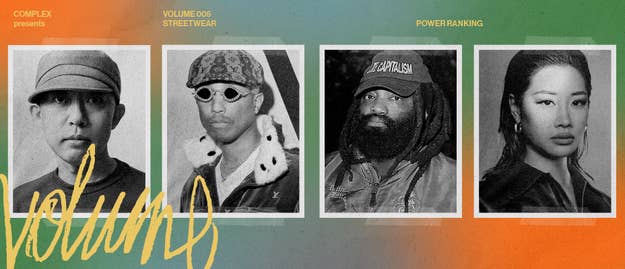
How do you define streetwear in 2023?
It’s a complicated question since the category used to feel very specific. In the ‘90s, streetwear brands drew from then-niche subcultures like skateboarding, punk, hip-hop, and graffiti. They produced literal “street wear,” like T-shirts, hoodies, jeans, tracksuits, and sneakers that targeted a younger audience. But the category has evolved and the subcultures it reflects are now multibillion-dollar businesses, which makes the definition of streetwear much more nebulous—and in our opinion, that’s a good thing.
We define streetwear as clothing that appeals to youth culture and taps into the zeitgeist. It still references hip-hop, skate, punk, and graffiti, but the consumer base is broader and it’s not dictated by a price point. (If Gucci can sell us a $500 T-shirt, why can’t a “streetwear” designer?) Some consumers, like resellers, look to streetwear for financial gain; others participate because they want to follow trends or associate themselves with a community or tribe. None of this is entirely new. The category is just much more expansive.
Many designers on this list might view streetwear as a pejorative term, one that boxes them into a particular space and prevents their work from being perceived as elevated or luxury. But we’ve always viewed streetwear as high art and an important vehicle for storytelling that speaks to consumers in a way luxury brands could never. And it’s the reason why LVMH—which owns Louis Vuitton, Givenchy, Kenzo, Dior, and more—wants to align with or employ streetwear designers and personalities. Being connected with streetwear means being connected with cultural currency. And after many years of luxury brands taking from streetwear without any credit or acknowledgement, we aren’t mad at designers who started out making T-shirts helming fashion houses. So while not everyone on this list is solely a streetwear designer, they all impact the category, which influences fashion at large, as always.
How did we rank this list? We only included people who make and sell apparel and sneakers, which explains why someone like ASAP Rocky or his stylist Matthew Henson, who are both incredibly influential, aren’t on the list. Then we, a panel including well-informed members from the Style and Sneakers teams, individually scored each person’s power based on the following categories: their overall influence in fashion right now; their current relevance/brand desirability; their overall body of work; their staying power/consistency; and the value they bring to larger brands. After tallying those scores, we hashed out the ranking over multiple internal meetings and rounds of voting, which was always tight.
These lists aren’t meant to troll. They are meant to tell a story about the state of an industry that we love and respect. With that being said, here is our ranking of the most powerful people in streetwear right now. We invite your feedback, as long as it’s respectful and informed.
25. Colm Dillane

KidSuper’s popularity within the fashion space truly peaked when Louis Vuitton shockingly announced that it would tap founder Colm Dillane to design its first-ever guest capsule collection, which is currently available in Louis Vuitton stores worldwide. Dillane went from being a little-known Brooklyn-based streetwear entrepreneur to becoming a LVMH Finalist to releasing his own collection designed with Louis Vuitton’s atelier. Although KidSuper might not be the first brand that comes to mind when thinking of streetwear, Dillane’s rise to prominence has all the trappings of a streetwear success story. He went from selling T-shirts, hoodies, and hats out of his dorm in NYU to being considered a successor to Virgil Abloh by Louis Vuitton’s former CEO Michael Burke. Since day one, KidSuper has been built off Dillane’s whimsical art, which first resonated with local New York rap artists like the Underachievers and Joey Badass before garnering him a range of partnerships across the industry. Whether it’s the luxury label Stuart Weitzman, the liquor company Jagermesiter, or the vinyl toy label Superplastic, KidSuper has been a desirable collaborator for a multitude of brands. And yes, outside of LV, other big fashion labels have been watching Dillane’s moves. Before Jeremy Scott exited Moschino this year, he seemed to directly bite one of KidSuper’s runway show concepts and Dillane’s hand-painted aesthetics for recent collections. This year, according to WWD, Moschino has now considered Dillane to be Scott’s successor. Even if KidSuper’s most popular items, like his “Kissing Coats” and bags, haven’t caught on with the masses like a Telfar shopping bag or a Supreme box logo, he certainly has the world’s attention. Anyone who was in Paris for KidSuper’s Fall/Winter 2023 show can testify to that. Dillane drew such a massive crowd to a fashion show (presented as a stand-up comedy festival) that the police had to be called in. That show alone confirms that KidSuper is not going away anytime soon.—Lei Takanashi
24. Clint419

We’ll admit that it took us “Yanks” at Complex a hot minute to recognize Clint 419 and Corteiz, a bubbling streetwear brand based in the United Kingdom that’s known for creating pandemonium in the streets for its hyped in-person drops. Since launching Corteiz in 2018, Clint has become one of the most recognizable young kingpins within streetwear today. Sure, he’s fostered a cult internet following by sporadically dropping new products through a password-protected website that redefines the scarcity of online streetwear drops. But Corteiz is a brand consistently creating hype in real life. Complex saw it happen in real time earlier this year, when our team covered the release of its Nike Air Max 95 collaboration in New York City. Trust us, it’s hard enough to get a group of friends to meet you by Penn Station unless you’re seeing a game or concert at Madison Square Garden. Yet, Clint managed to assemble a crowd of hundreds of New Yorkers in front of a random Nike billboard in the middle of 34th Street who then all madly dashed to a bodega in Alphabet City to cop a regional exclusive colorway of Corteiz Air Max 95s. The crowd was so large that the New York Police Department was even called in to deal with the overflow. Clint, who’s highly engaged with his followers on his own personal social media accounts, is so charismatic that in France, his supporters preferred chasing him on a bus crawling across Paris instead of actually heading to the location where Corteiz dropped its Air Max 95s. Corteiz’s collaboration with Nike was a major look and showed the world that Corteiz’s fanbase wasn’t based solely in “Lundun.” Clint has become such a rising icon within streetwear that he’s landed his own Dazed cover and has been spotlighted in campaigns by both Supreme and Aime Leon Dore. Of course there’s a chance that Corteiz may just be flash in the pan. It’s a brand whose hype and allure is fueled moreso by its unconventional approach to releasing products than the larger meaning behind the logo-driven merch it’s selling. But Clint has quickly captured the world’s attention and we think he has plenty more in store.—Lei Takanashi
23. Angelo Baque
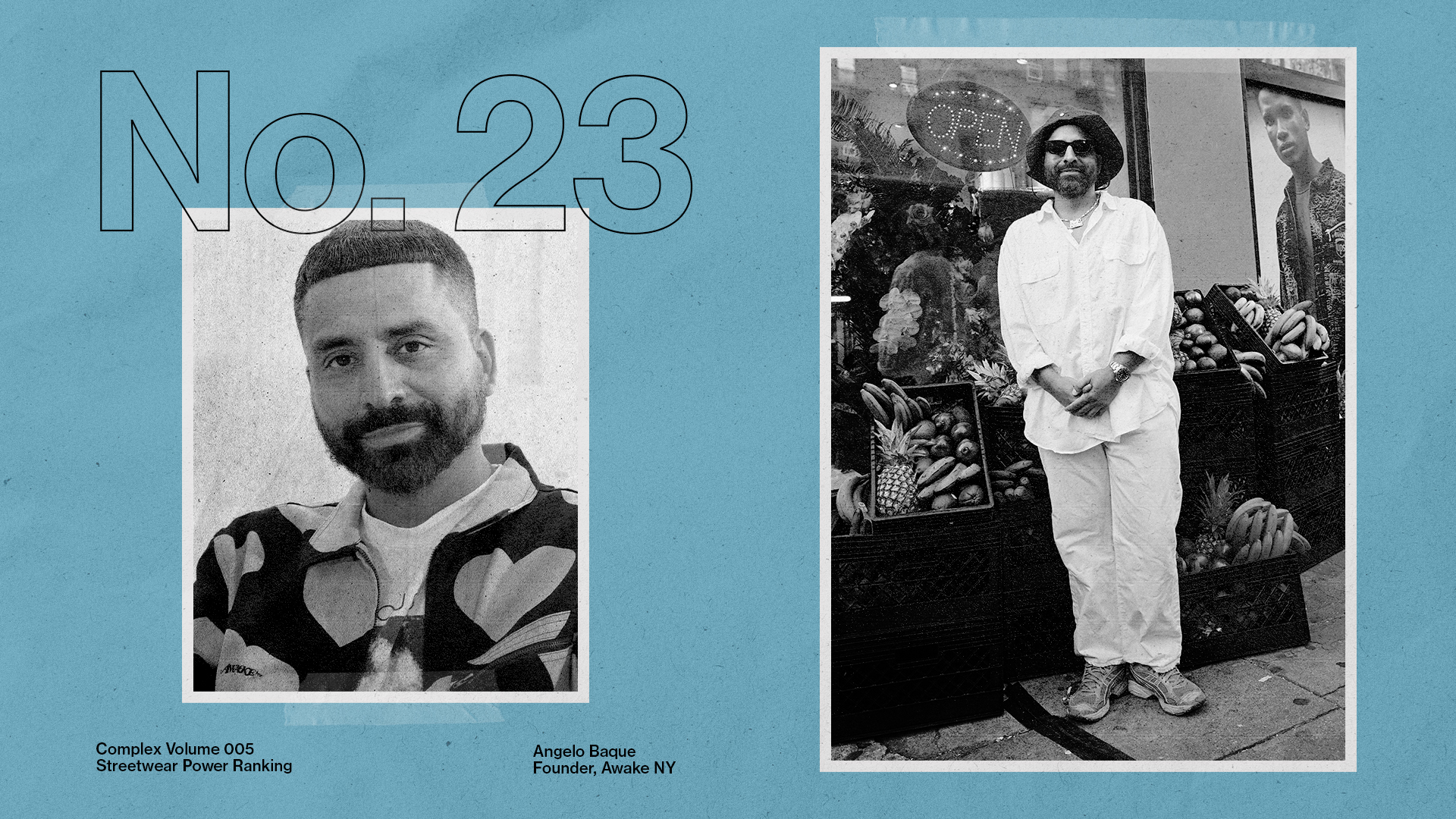
Since launching Awake a decade ago, Angelo Baque has carved his own lane within streetwear by developing a label that puts an emphasis on building a cool, yet inclusive, community. We’re not talking about highlighting New York City influencers in campaigns for a lookbook. The community that Baque has nurtured with Awake is found in real life and has been boldly present since they opened a proper flagship store in its hometown this year. Anyone who’s been outside for Awake’s recent store events can attest that Awake has the city’s attention. Whether it was the brand's highly anticipated store opening or its recent launch party for a collaboration with Milk Studios, Awake has captured an energy for streetwear in New York that hasn’t been seen in years. Of course, when comparing Awake to its peers, it has yet to become a brand with stores across the world like Supreme (where Baque worked for a decade) or one known for releasing super-hyped products on par with Denim Tears’ cotton-wreath apparel. But like Frank Sinatra said, if you can make it in New York, you can make it anywhere. As streetwear consumers shift toward brands that stand for diversity and inclusivity, Awake is a genuine leader within the space. Unlike most streetwear labels that typically only speak to men, Awake’s lookbook models and its recent collaboration with Milk Makeup show it’s also committed to authentically addressing women. Baque has also played the collaboration game well by not just landing major deals with brands like Tommy Hilfiger and Mercedes-Benz but by also urging his corporate partners to give back rather than just sell products. A UPS collaboration could be seen as a sell-out move for most brands. But when Awake collaborated with UPS last year, they used it as an opportunity to spotlight Latinx-owned labels at a pop-up during New York Fashion Week and fund programming and scholarships for The High School of Fashion Industries, a New York City public school. That philanthropy also extends beyond such collaborations, as shown through a T-shirt the brand independently released last year to raise $87,540 for victims of the Twin Parks Fire in the Bronx. Awake is small but clearly growing, with larger mainstream link-ups with entities like Jordan Brand on the horizon. Awake hasn’t hit its crest yet and the tide is only rising.—Lei Takanashi
22. Yoon Ahn
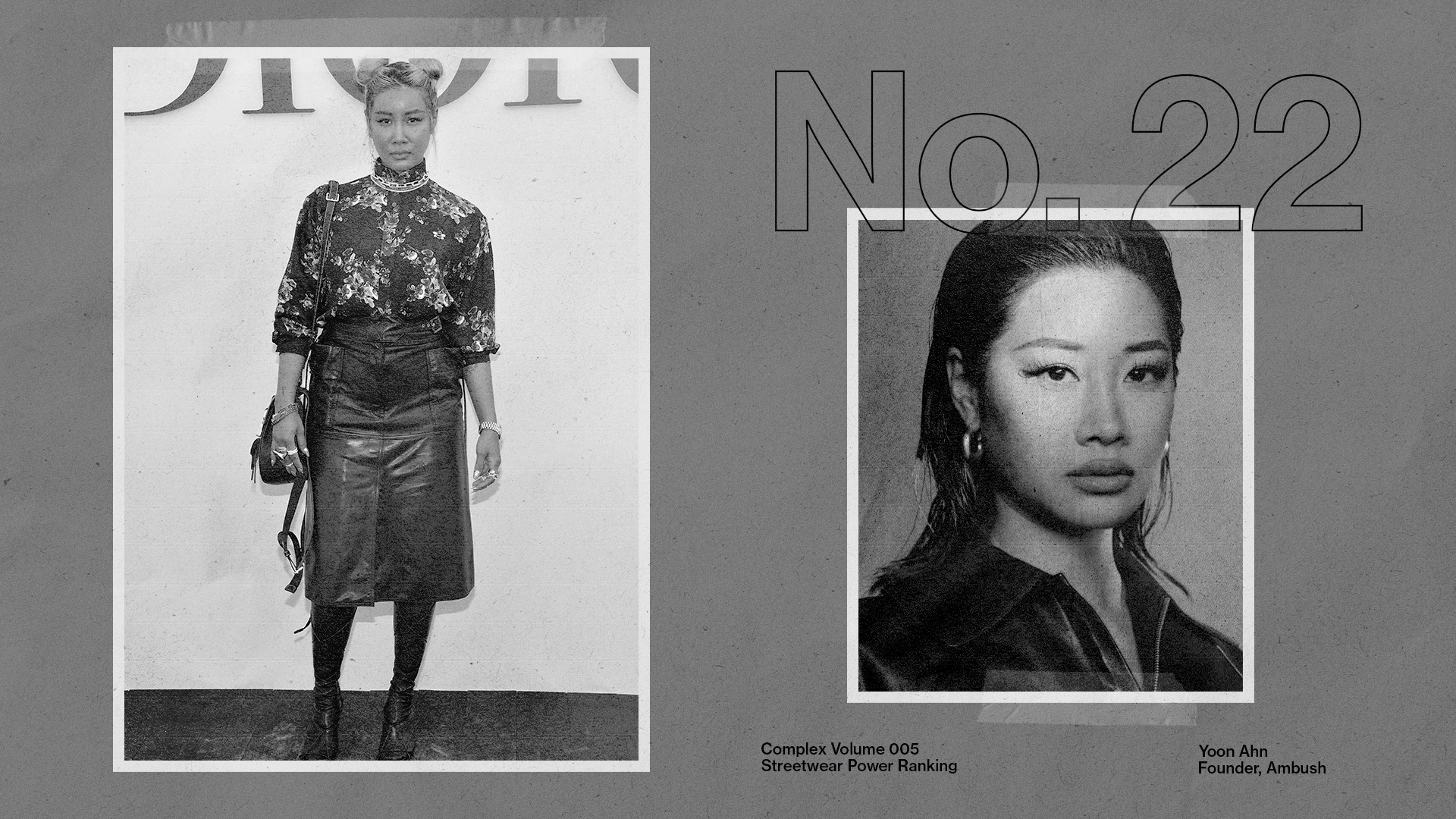
Yoon Ahn went from designing album covers for her husband Verbal’s rap group Teriyaki Boyz to one of the most influential women in streetwear history. It all started with the comic book-inspired “POW” jewelry she created in the mid-2000s, worn by the likes of Kanye West, Pharrell Williams, and more. Since then, she’s solidified herself as an industry trailblazer with the founding of her contemporary brand AMBUSH in 2008 and a slew of collaborations, including her ongoing partnerships with Nike, NIGO, and Rimowa to name a few. When she debuted a ready-to-wear collection with AMBUSH just two years into her design career, LVMH was quick to name Ahn a nominee for its prize. Since then, her work has been co-signed by celebs around the globe from G-Dragon to 21 Savage, who wore a custom metallic leather AMBUSH set onstage during Drake’s It’s All a Blur Tour last month. After the LVMH nomination, Nike tapped her for what would become a longstanding partnership to design clothing, sneakers, and accessories. She’s reimagined classic shoes like the Nike Air Max 180 by adding a high top and zippered boot, and more recently the Air More Uptempo with a low-top—both of which haven’t been done before. In 2020, Ahn became the first woman to design a Nike x NBA collection, and her work on the project is even framed on the Nike Campus in Portland. Throughout her career, Ahn hasn’t just been plugged into what’s cool, she’s been a driving force in defining those trends for the last two decades. Ahn’s influence is undeniable, and her penchant for constant innovation has made her one of streetwear’s finest.—Alessandra Maldonado
21. Kanye West
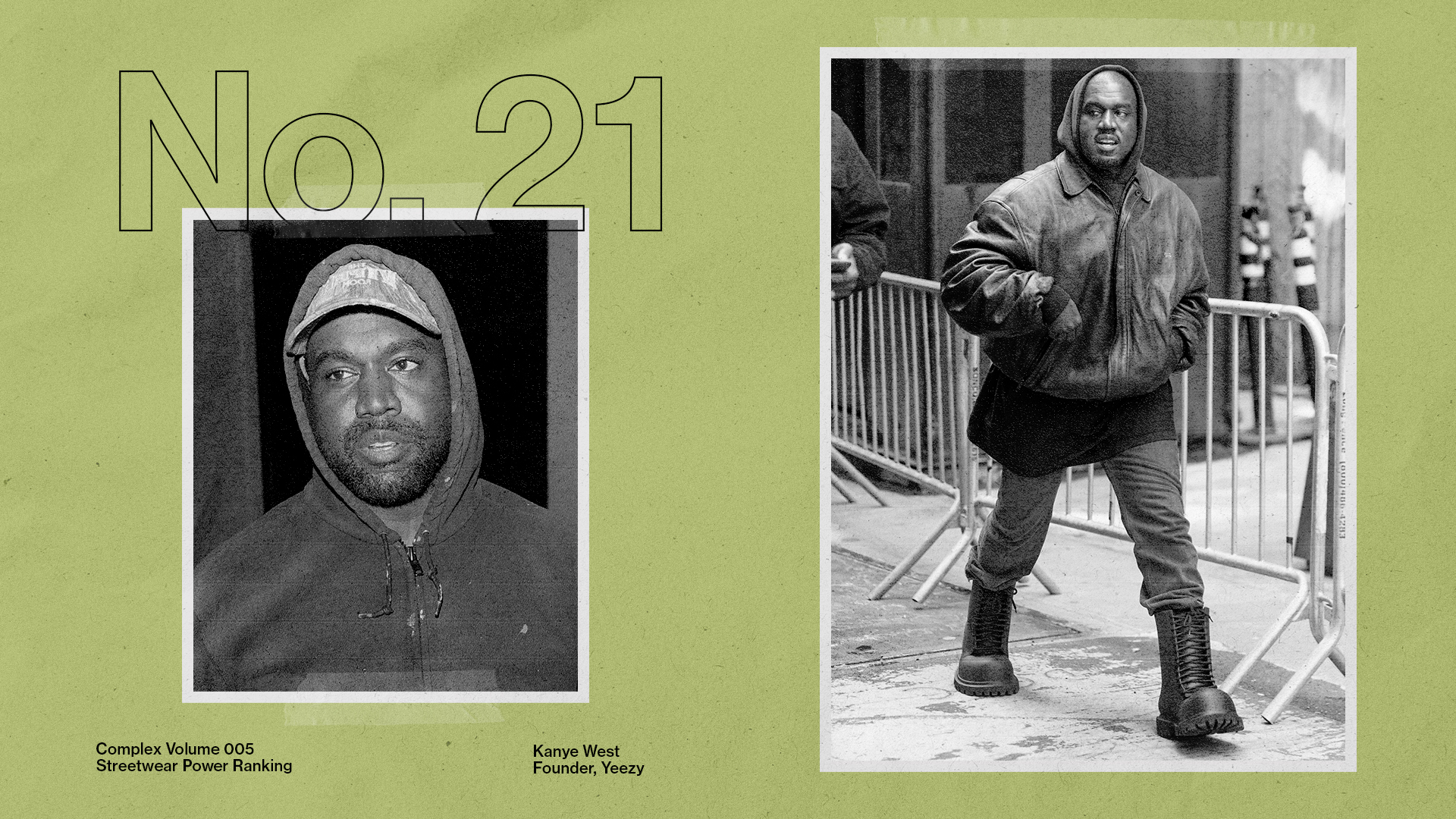
Ye's influence in streetwear has waned since he made anti-Semitic statements in October and lost his deal with Adidas. As a result, Adidas was clearly financially impacted by cutting ties with him. So much so that Adidas ended up striking a deal with Ye to sell its remaining stock of Yeezy sneakers to the public this summer so that the brand could save itself from climbing up to $772 million in operating losses for the fiscal year. That plan not only worked (Adidas shrunk its expected operating loss for 2023 from $752 million to $484million), but also pulled in $437 million in revenue. Yes, Ye has become extremely problematic since his golden years of influencing streetwear. And although he will likely never be taken seriously by fashion critics again after unveiling “White Lives Matter” shirts at his Yeezy Season 9 show last year, the numbers for Adidas Yeezy do not lie. Adidas execs said the brand would “make use of those rights” they have over Ye’s designs and they’re still considering turning Yeezy designs into mainline Adidas footwear products without Ye’s name when the time is right. Beyond the fact that Adidas has produced its own products clearly influenced by the Yeezy aesthetic, Ye's work has influenced the market at large. When it comes to labels that focus on minimalist wardrobes like Fear of God or Skims, Ye's fingerprints are impossible to rub off. Both Jerry Lorenzo and Kim Kardashian have credited Ye for creatively making their brands what they are today—Ye came up with the name and logo for Skims, which is currently valued at $4 billion. Of course, there’s also the everlasting influence Ye has had on the relationship between streetwear and luxury. Pharrell and Virgil Abloh would never have been tapped to design menswear for Louis Vuitton had it not been for the doors opened by the Louis Vuitton Don himself, who was the first rapper to ever design a line of LV sneakers (with Marc Jacobs) in 2009. And although Yeezy Gap is no more, and failed to deliver Gap the turnaround it desperately needed, it’s clear that Ye’s Midas touch as a designer was enough to transform Gap’s affordable basics into hyped streetwear—let’s not forget that when Gap first dropped Yeezy Gap hoodies it led it to the most sales for an item sold in a single day in Gap.com history. Despite all the controversy Ye has recently drummed up, his most die-hard followers will continue to support and wear his clothes. Ye will continue to be a powerful figure within streetwear, whether we like it or not.—Lei Takanashi
20. Chris Gibbs & Beth Birkett Gibbs

Union is where larger brands go to discover what’s cool. Husband-and-wife team Chris Gibbs and Beth Birkett Gibbs have become the ultimate co-sign for brands like NEIGHBORHOOD, WTAPS, and Visvim, which were first stocked at Union and then quickly picked up by larger department stores in the US. They have a keen awareness of what’s good and what will last beyond a trend cycle, which has helped their store remain relevant for the past two decades. The original Union store, which opened in New York in 1989, was founded by Supreme’s James Jebbia and Mary Anne Fusco. It was a small shop known for selling graphic T-shirts alongside an eclectic mix of brands from all over. Beth, who worked in-store at Stüssy and Supreme, introduced Chris to James, and the downtown streetwear scene in general, which is how Chris started at Union as a sales associate in the late ‘90s. He moved his way up before eventually leaving for L.A. in 2003 to work for Eddie Cruz, who opened a Union Stüssy shop on La Brea in 1991. In 2010, Chris made an even bigger move, buying the store from Cruz, who was more focused on Undefeated. For a while Chris was the face of Union, but Beth, a costume designer, has always been a key partner and co-owner, working with him behind the scenes on visuals, marketing, and styling that helped the store develop a singular point of view that celebrates Blackness. Together they’ve made Union a destination and a trusted platform for streetwear and luxury brands alike, including a growing inline brand, and opened two additional Union outposts in Tokyo and Osaka. Because of the power of their brand, Nike has leaned on Union to connect with the community they’ve cultivated. The relationship has resulted in much sought-after sneakers, starting with the Air Jordan 1 Retro High in 2018 and most recently the Air Jordan 1 High Woven and a platform Jordan 1, which tells the story of Beth and Chris meeting in Brooklyn in 1996. Beth has inched her way more into the forefront with her own line and retail platform, Bephies Beauty Supply, and as a judge on HBO Max’s The Hype, a streetwear competition show. You could call Chris and Beth actual tastemakers, who help customers understand what’s cool and show the industry how to tell thoughtful stories about sneakers and streetwear. —Aria Hughes
19. Grace Wales Bonner
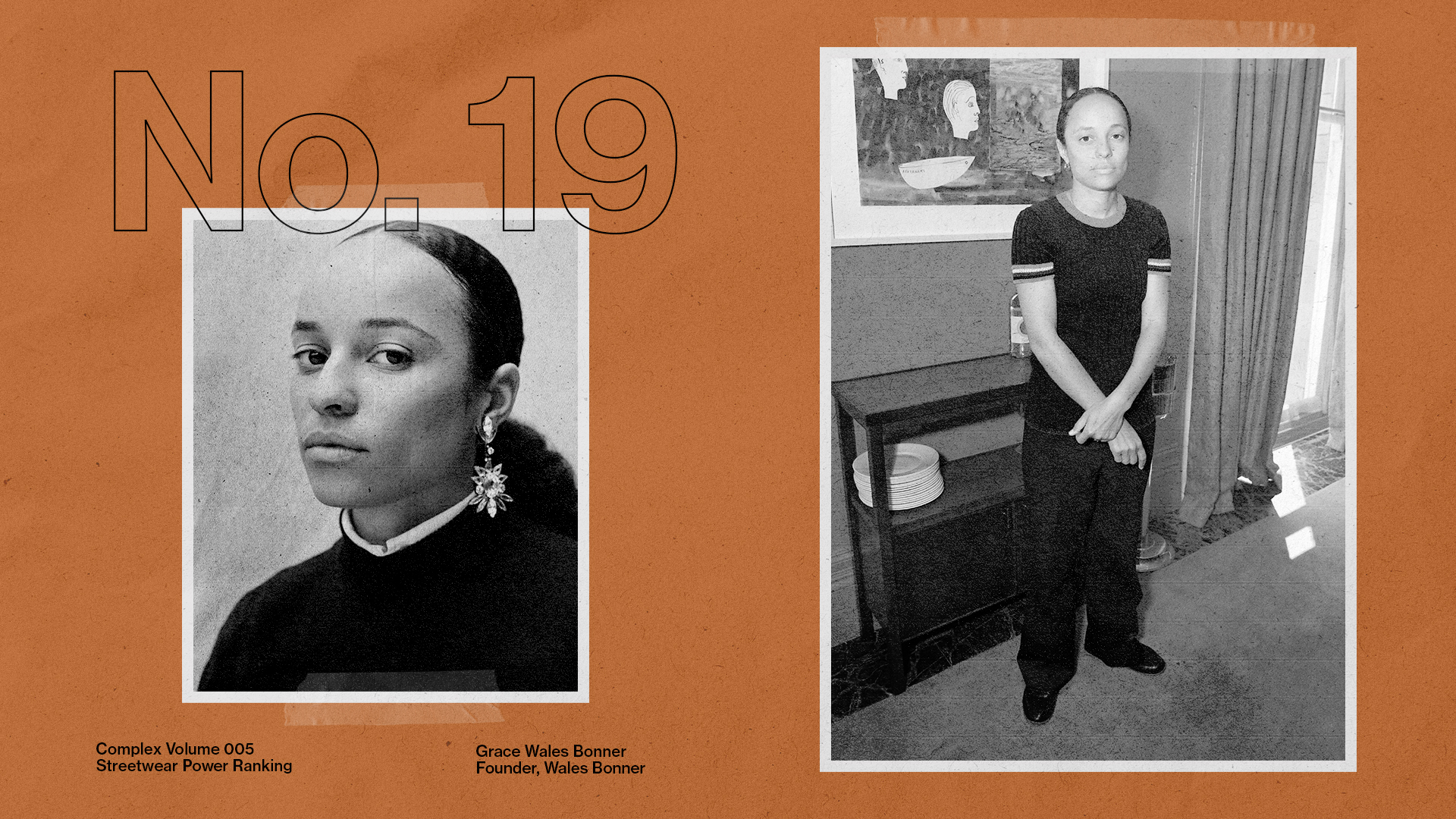
Grace Wales Bonner makes luxury clothing, but her sophisticated take on athleisure has redirected how brands approach menswear at large, which includes streetwear. When Bonner started her line in 2015, shortly after graduating from Central Saint Martins, her goal was to imbue menswear with Black culture references that were seldom found in luxury fashion at the time, and explore Black male identity. This approach has a lot of alignment with streetwear, but Bonner relies less on graphic T-shirts and more on beautifully crafted garments that push the boundaries of menswear. Because of this, she was the first menswear designer to win the LVMH prize in 2016. She does very well with tailored clothing, making it feel more relaxed and cool for a younger consumer, but her ability to make sportswear feel so special and considered is a big reason why she’s on this list. She started her relationship with Adidas Originals in 2019, presenting collaborative pieces like a cream tailored tracksuit and a red knit vest as part of her Spring/Summer 2020 Mambo collection. Their relationship has only deepened, with Bonner bringing her refined sensibilities to the sportswear brand, and producing highly coveted apparel and sneakers that feel familiar yet wholly new, like the silver Adidas Samba with a gum sole, three crochet stripes, and fold-over tongue (which seems to have influenced Rihanna’s latest Avanti style for Puma). We also saw hints of her aesthetic during Pharrell’s outing for Louis Vuitton with the pearl embellished tracksuit he presented (which Lil Uzi later wore). Just as Bonner wanted to redefine luxury clothing, she’s helping Adidas and the industry understand what sportswear can be and the stories it can tell.—Aria Hughes
18. Lev Tanju
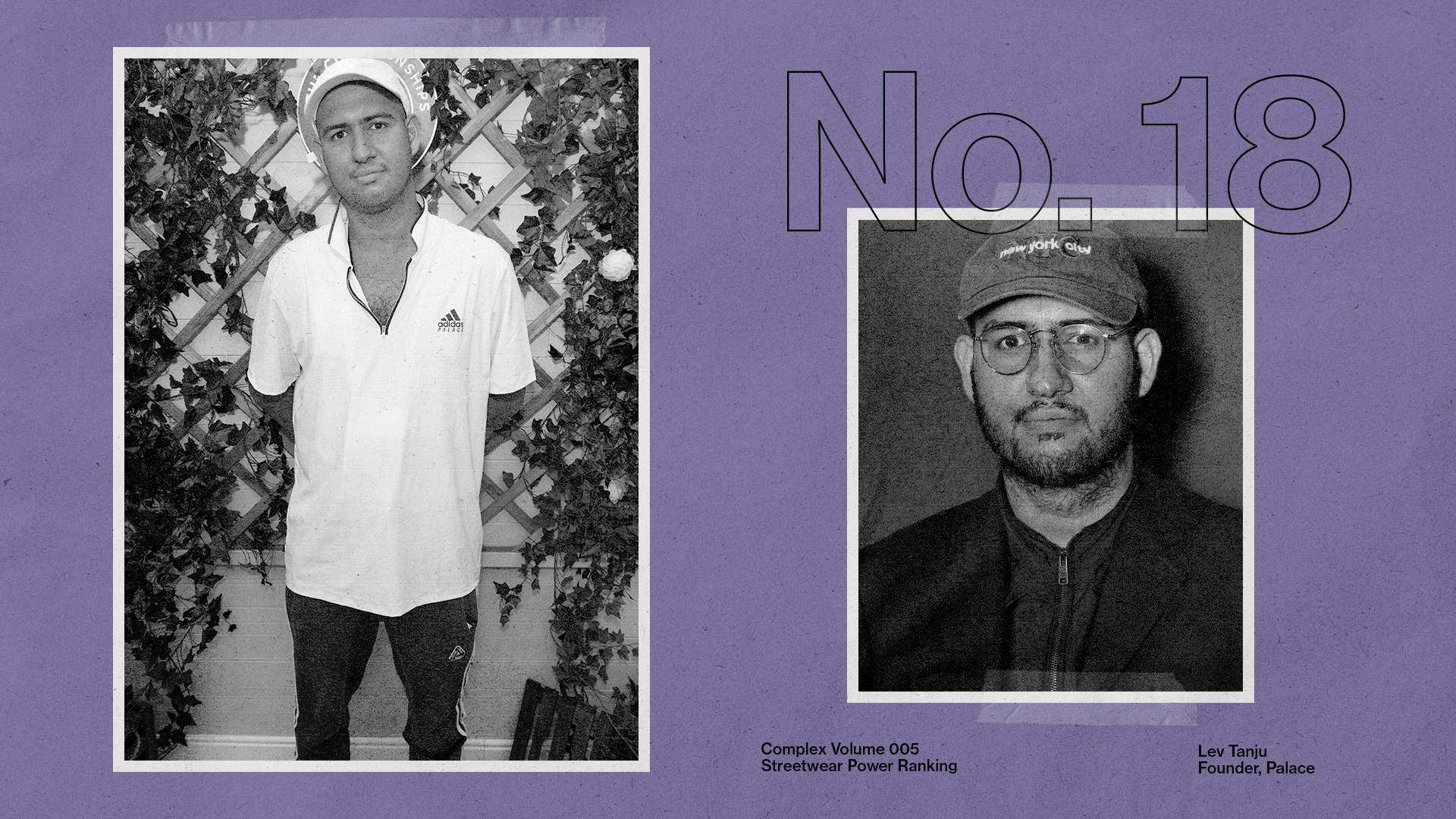
Back in the late 2000s, Lev Tanju was just a 20-something skater who looked at the state of English skatewear with cynicism. Now, he’s a streetwear heavyweight with a thriving brand and an absolutely ridiculous number of collabs under his belt. Ever since he founded Palace in 2009, Tanju has been able to steadily build momentum for the brand. Without any formal training in design or fashion, he developed Palace through his off-kilter perspective while capturing the attention of brands like Gucci and McDonald’s, and even Elton John—all parties who haven’t normally mingled with skaters. Although the brand partners in Palace’s rolodex span across industries that don’t necessarily converge with skating, the pieces coming out of these collabs feel intrinsically part of Palace’s repertoire and add to its global appeal. From its reinterpretation of the New Balance 991 and the Salomon XT-Wings 2 trail sneakers to its own Crocs clog and Polaroid camera, the brand has far surpassed the world of skating. And although the team behind Palace is strong, the brand really is a reflection of Tanju’s unrelenting cleverness and tongue-in-cheek humor. He came up with the idea behind the brand’s iconic Tri-Ferg logo with graphic design luminary Fergus Purcell and even writes every uninhibited product description on the site. McDonald’s even got in on Palace’s description game and featured some of his words in their collab campaign. Palace is a British brand but its influence is worldwide, especially since they’ve been able to set up shop in London, Los Angeles, New York, and Tokyo. After all, everyone speaks the language of wearing cool clothes, right? Tanju has blurred the lines between luxury and skatewear in surprising ways. I mean, how often do you see skaters wearing head-to-toe Gucci? There’s a reason people refer to the brand as the new Supreme and it’s not because it’s copying its sauce. —Alessandra Maldonado
17. Salehe Bembury
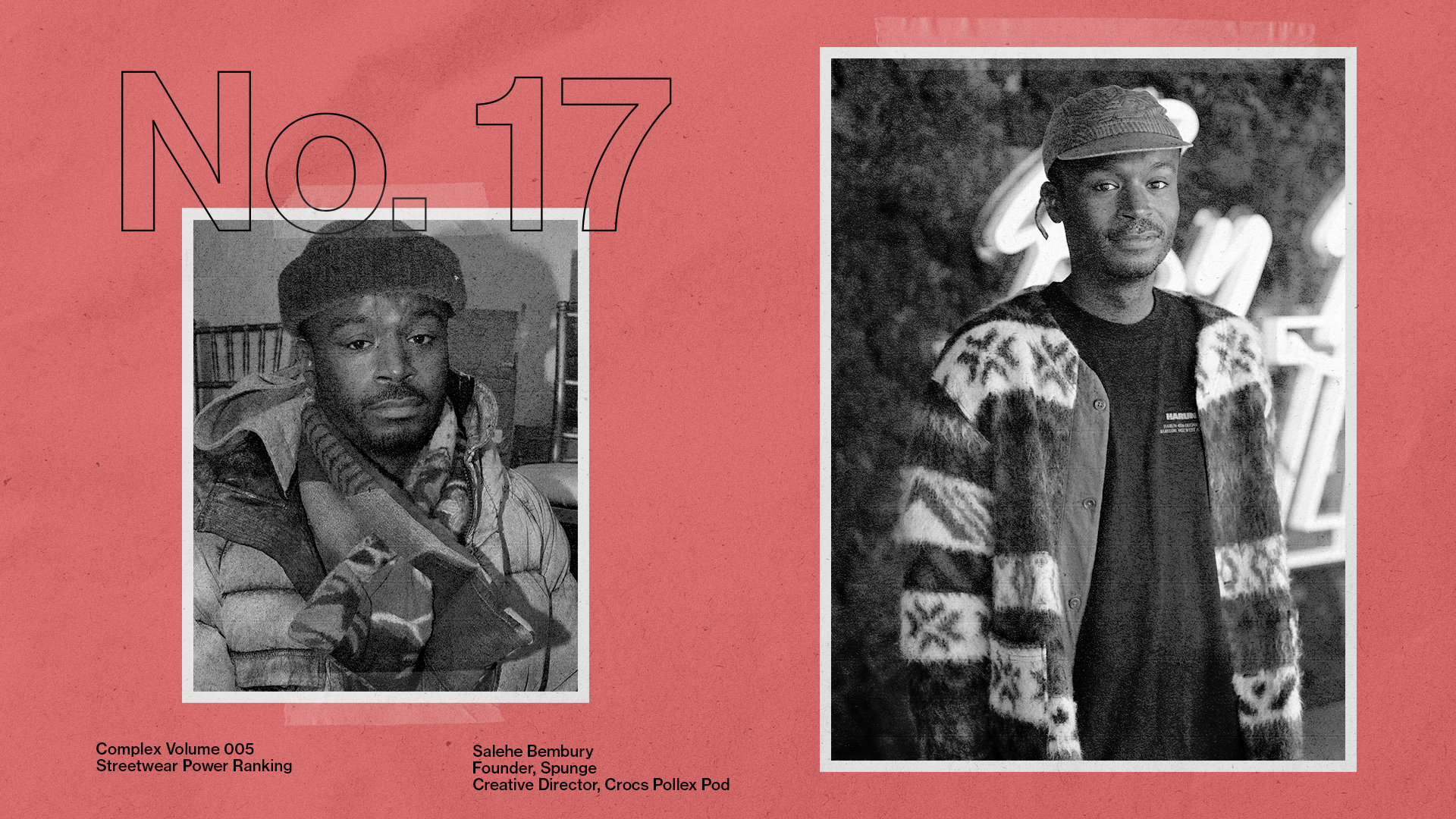
Since entering the spotlight in 2018 as the designer of the Versace Chain Reaction, Salehe Bembury hasn’t slowed down. The throughline across his work has been an emphasis on his passion for hiking and the great outdoors. While he didn’t spearhead the movement, his designs have further pushed the gorpcore aesthetic into the mainstream consciousness. His most consistent work has been as a collaborator with New Balance, which kicked off in 2020 with an orange 2002R and has gone on to include seven other releases. New Balance even gave Bembury the opportunity to design his own original silhouette from scratch, the 574 YURT, a testament to how much the brand values him as a collaborator. That level of creative freedom has also transferred over to his work with Crocs. The brand’s foam clogs were long considered a fashion faux pas. Bembury’s Pollex clogs have played a pivotal role in helping Crocs shed that stigma. When they debuted in December 2021, they sold out in just 35 seconds. It was one of Crocs’ fastest sell-throughs ever. Bembury’s Pollex clog was even 10th on the Lyst Index for Q4 2022, a metric that compiles data from the Lyst shopping app, social media, and search traffic to determine the hottest products on the market at any given time. Further proving his value, Bembury signed a two-year deal with Crocs earlier this year to be the creative director of the Pollex Pod collection. The goal is to grow Pollex into its own category consisting of multiple silhouettes. Bembury’s name has become one that people get excited by, so much so that he has even sold out sneaker collaborations in the States with Chinese sportswear brand Anta. It feels like anything that he puts his name on will spark interest. Where Bembury’s output has lacked thus far is on the apparel side. Aside from some promising capsules with New Balance and sporadic releases from his brand Spunge that launched in 2020, the footwear has clearly been the main focus. This year, we were treated to a collaboration with Moncler Genius, a glimpse at what he can do on the apparel side with the proper resources. Like most of his products, the capsule took cues from nature with pieces like a mossy green down jacket made of ripstop and brown puffer vest with a utility vest overlay. In a fashion world currently obsessed with the great outdoors, Bembury is continuing to scratch that itch. We look forward to seeing him build up his apparel portfolio in the future. —Mike DeStefano
16. Joe Freshgoods
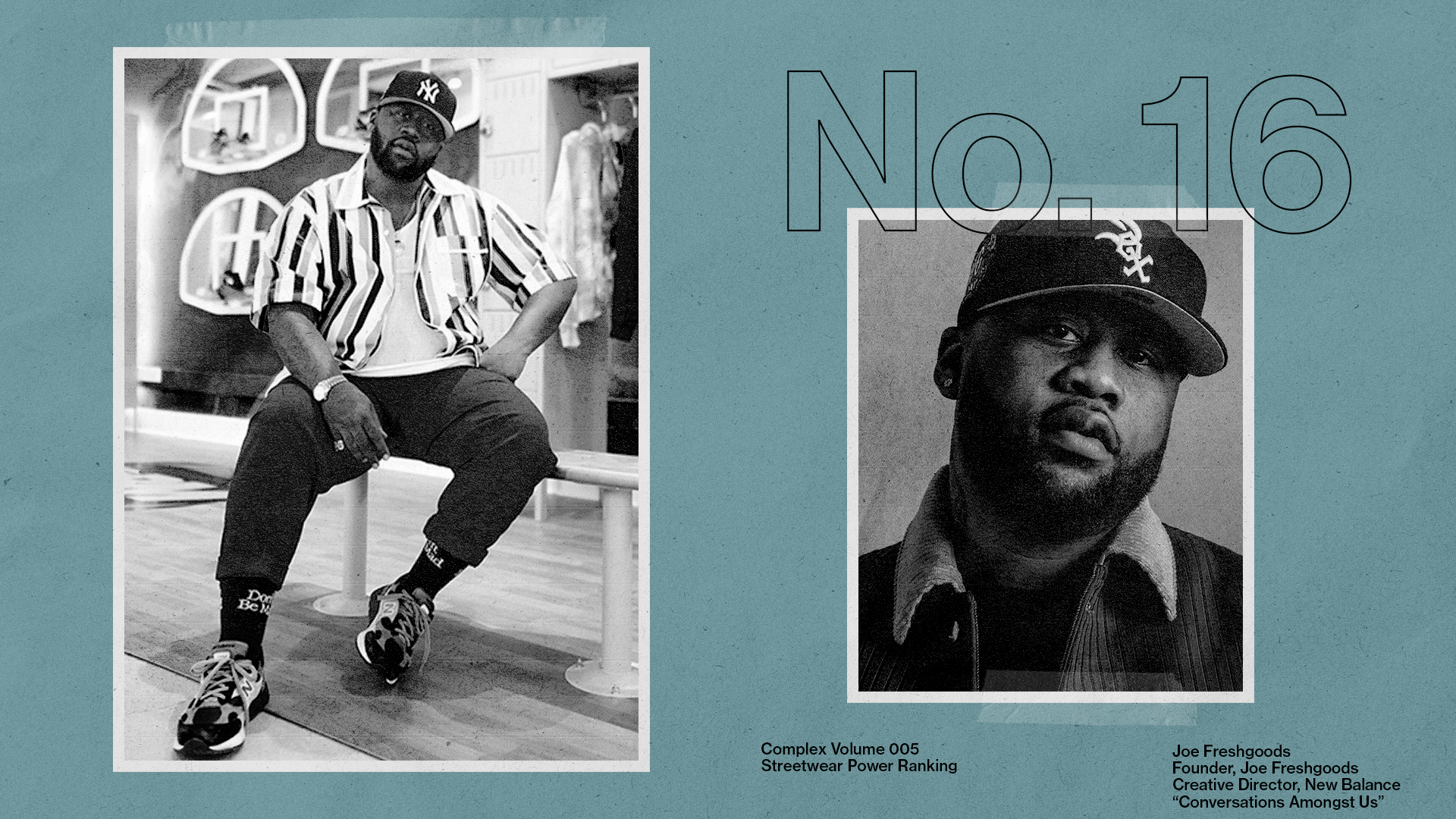
Fun fact: Joe Freshgoods was one of the first streetwear brands to collaborate with McDonald’s. It happened in 2018, before the fast food chain went on to partner with the likes of Travis Scott, Cactus Plant Flea Market, and Palace on merchandise. Collaborations are commonplace in streetwear, but when Joseph “Joe Freshgoods” Robinson works with larger brands, it dictates how they go on to work with other streetwear lines. And that’s for a couple of reasons. For one, he’s an incredibly advanced storyteller, never allowing his brand or identity to get subsumed by the corporation. And he successfully executes, creating desirable products and a story that many people connect with. Take New Balance for example. Robinson can be credited with helping reinvigorate the once-sleepy sneaker brand thanks to his well-designed product and his authentic stories, starting with the Don't Be Mad x 992 'Anatomy of a Heart' sneaker that was released during NBA All-Star Weekend in 2020 alongside Kawhi Leonard’s New Balance OMN1S sneaker. Leonard also donned a very clever “No Emotions Are Emotions” T-shirt conceived by Robinson for the collection. This moment led to New Balance appointing him as the creative director of their “Conversations Amongst Us” campaign. But before he partnered with the likes of New Balance, Snapple, Converse, and the Chicago sports franchises (Blackhawks, Cubs, and White Sox), he was building up his fanbase in the Windy City, catering to the “regular consumer” via Fat Tiger Workshop, a Wicker Park shop he opened with Terrell “Rello” Jones, Des Owusu, and Vic Lloyd, and setting up pop-ups all around the country instead of wholesaling to major boutiques. This allowed him to connect to his audience directly and not just sell to them. He’s built his brand on his own terms, forcing the industry to take notice. And now that he has everyone’s attention, which is a feat in and of itself, he hasn’t let up. —Aria Hughes
15. James Whitner
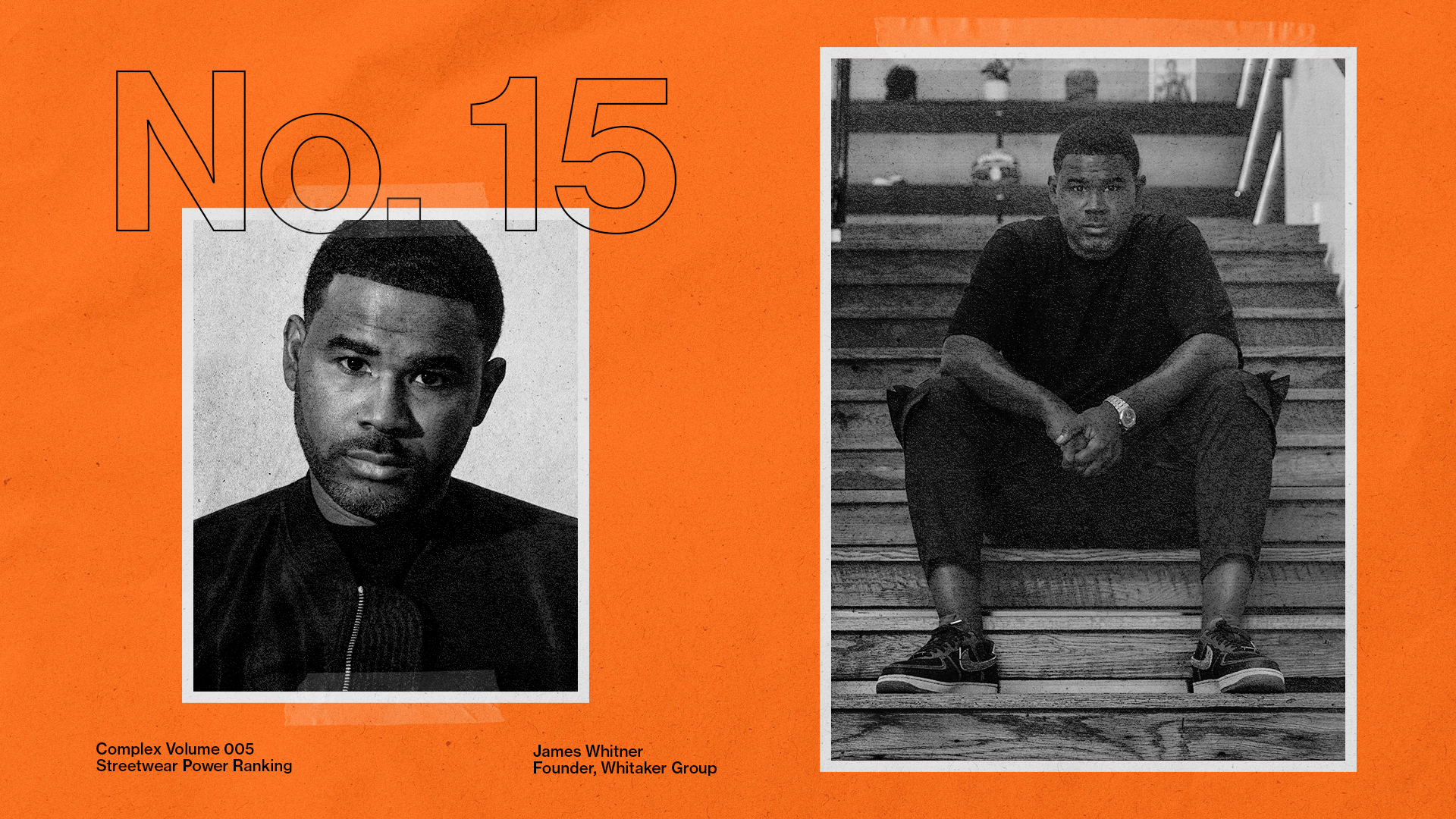
James Whitner has had a slow and steady climb in the streetwear space, grinding quietly for the past 18 years. But over time his voice has become a prominent one that guides the industry, helping companies understand the importance of pouring back into the Black community it profits from. He started in 2005 with Flava Factory, a sneaker store he opened in Charlotte, North Carolina that leaned “urban.” But he quickly evolved, introducing Social Status in 2007, a more premium retail concept that targets a younger consumer. In 2014 he launched a luxury concept store called A Ma Maniere in Atlanta, and eventually added APB and Prosper. These stores make up his robust retail portfolio that sits under The Whitaker Group. It’s hard enough to own and operate one store, but Whitner is independently running more than 20 across the U.S. He had the foresight to cater to underserved secondary markets outside of New York and Los Angeles, and go beyond product. Whitner offers a variety of experiences to these communities, merging hospitality, dining, and charity with beSocial, which are community spaces near The Whitaker Group’s retail stores. Nike and Jordan Brand understand the power of his brands and his voice, and have utilized both Social Status and A Ma Maniere to connect with the community he’s cultivated. He’s become one of their most frequent collaborators, releasing multiple silhouettes with both brands over the last few years and using sneakers as a means to tell pointed and meaningful stories about Black people (whether that’s a campaign highlighting the beauty of Black women or an episodic series depicting what it was like receiving food stamps on the first and 15th of each month). And when he places one of his logos on a sneaker, it increases in value or brings renewed interest to a silhouette people weren’t paying attention to, as seen with the A Ma Maniere x Jordan Air Ship. And with AMM, he’s even established a signature color palette (sail, black, and burgundy) that the industry now associates with his work. There’s power in creating products people want to buy, but it’s even more powerful when that product acts as a medium to empower the underserved communities that fuel the sneaker and streetwear industry.—Aria Hughes
14. Nigo
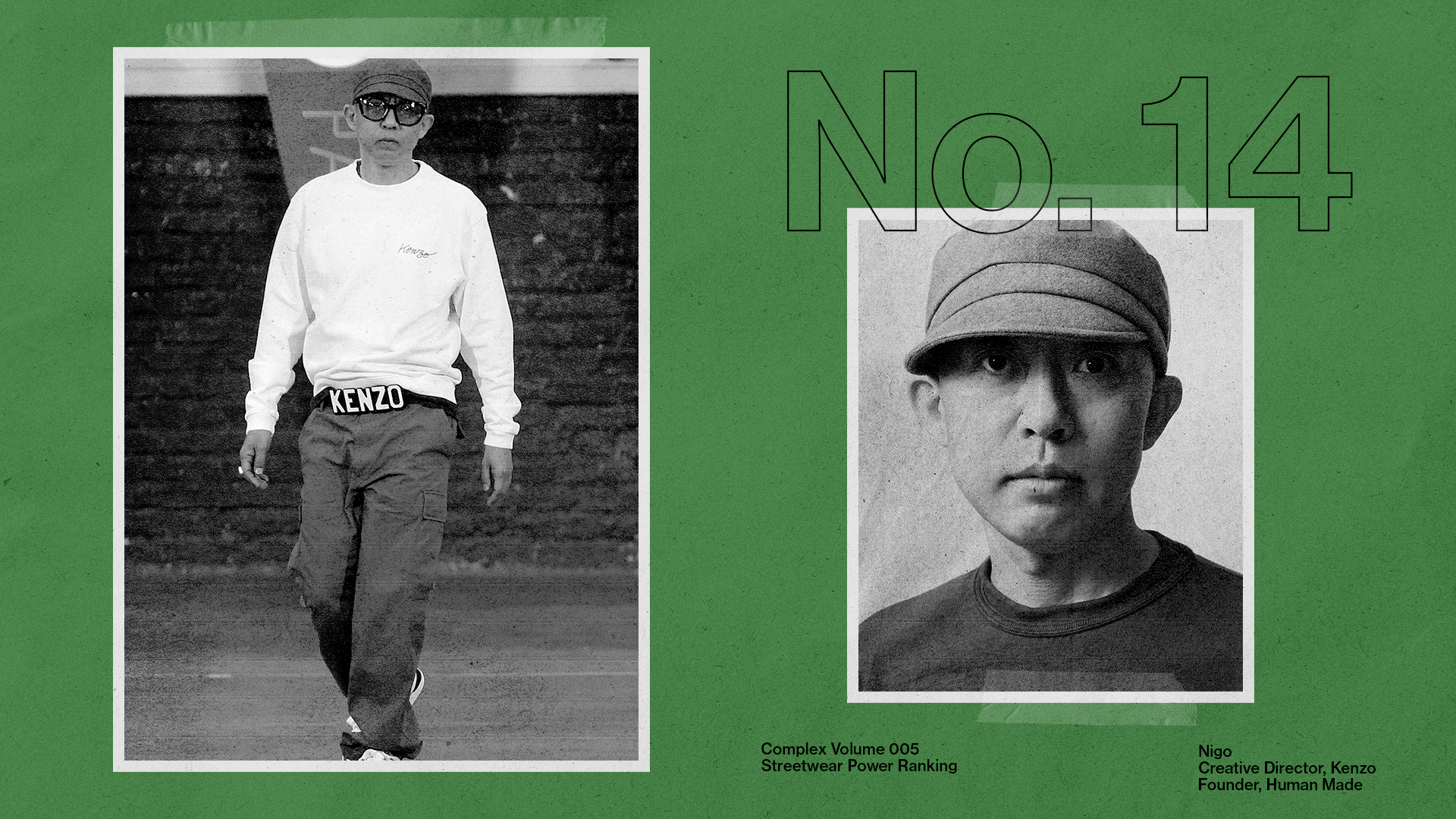
When Nigo was named the artistic director of Kenzo in September 2021, he was the latest example of LVMH using streetwear to reinvigorate one of its luxury houses. The effects of his appointment were seen almost immediately. Seemingly overnight, Kenzo was back in the conversation, and not just because people were making fun of its tiger logo sweaters. People were excited to see what Nigo would bring to the brand. His debut runway show in January 2022 was attended by Pharrell, Kanye West, and Tyler, the Creator. You can’t get much more relevant than those names and they likely wouldn’t have been there without Nigo’s involvement. Three seasons into his time at Kenzo, Nigo appears to have the brand on the right track. He’s even used his power to invite mentees like Japanese streetwear designer Verdy to collaborate with Kenzo. LVMH isn’t the only industry giant still looking to tap into Nigo’s influence. The Japanese designer is rumored to be releasing a sneaker with Nike in 2024, adding him to a collaborative roster that includes other influential figures like Travis Scott and Yoon Ahn ( Ambush). This comes after Nigo’s multi-year partnership with another industry leader in sportswear, Adidas, that ran from 2014 to 2022. And of course there’s Nigo’s label, tHuman Made, with whom Nigo has flexed his status by tapping stylish rappers like ASAP Rocky and Lil Uzi Vert for official collaborations that have kept younger fans excited. These friendships with some of hip-hop’s most prominent figures have even allowed Nigo to make music of his own (and headline a ComplexCon concert). His 2022 album I Know Nigo featured tracks with Lil Uzi Vert, ASAP Rocky, Tyler, the Creator, and Pharrell. And now with his longtime friend Pharrell at the helm at Louis Vuitton, it shouldn’t be long before we see him adding his streetwear sensibilities to LV once again (he collaborated with Virgil Abloh on Louis Vuitton’s LV2 collection in 2019). Nigo is one of the forefathers that helped streetwear be treated like a luxury commodity throughout the 2000s, long before it was commonplace to do so. It’s rather fitting that now he is using his legacy in streetwear to inject coolness into luxury fashion. Over three decades in the game, the General is still in command. —Mike DeStefano
13. Tyler, the Creator
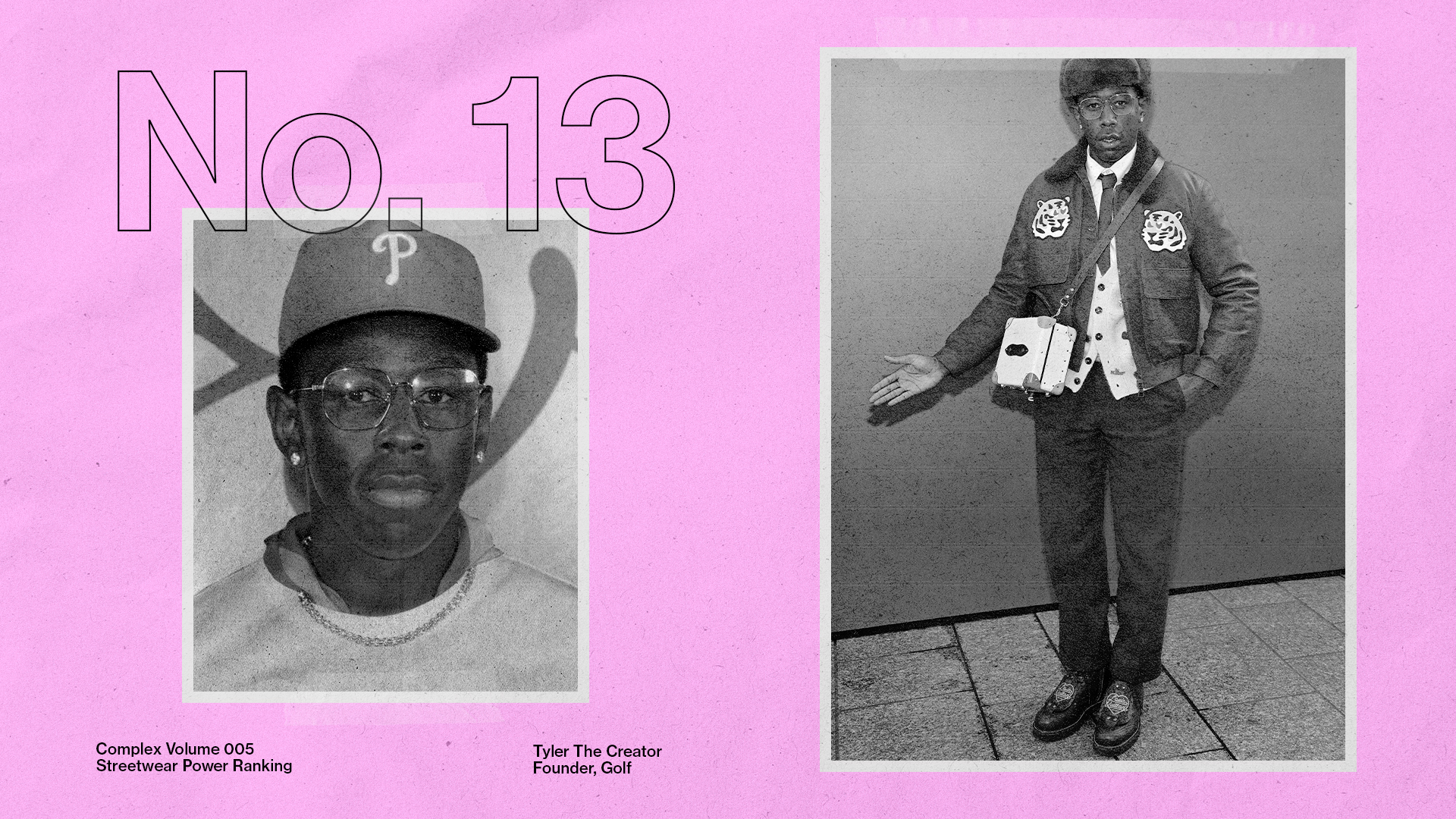
You could say that Tyler, the Creator helped revitalize Supreme in the early 2010s when the brand needed it most. When Tyler wore a heather gray Supreme box logo hoodie for his first live TV performance on Late Night With Jimmy Fallon, it was a cultural moment that ignited interest in a new set of young consumers. Little did we know that Tyler would understand his influence early on and in 2011 launch his own brand, Golf Wang. It’s modeled closely after Supreme (named after his collective Wolf Gang) but feels distinctly Tyler with its vibrant color palette and youthful prints like flowers and flames. In late 2017, Golf opened a permanent flagship space on none other than Fairfax Avenue in Los Angeles, the block where Tyler spent so many of his teenage days weaving himself into the fabric of LA’s streetwear community. Fairfax isn’t what it once was, but the Golf store still remains as one of the block’s last major attractions, selling pieces from the collection along with the latest Tyler album merch. As a testament to Golf’s growth, the brand opened its second flagship store in New York City in 2022. The brand officially celebrated its 10th anniversary a few weeks ago. He has also been aligned with Converse since 2017, a partnership that has resulted in Chuck Taylors done up in various patterns and materials, from pink leopard to quilted purple satin. He even released his own silhouette, the chunky Gianno in 2019. As Tyler’s taste has elevated throughout his career, his fans have grown with him. Sure, some of Tyler’s most loyal fans still prefer to wear some knee-high tube socks and a fluorescent striped T-shirt, but others have adopted his penchant for a nice pair of penny loafers, a mohair cardigan, or a perfectly pleated pair of chinos. People look to Tyler, the Creator for fashion advice, a sign of his far-reaching influence beyond his music. That style evolution has even materialized in a more elevated clothing line, Golf Le Fleur, which has offered its own fragrance, nail polishes, sherbet-colored luggage with Globetrotter, and oily leather jackets with industry leader Schott. Traditional luxury brands like Gucci have even tapped Tyler to star in campaigns (who could have guessed that would happen when he was eating cockroaches in 2011?). You can expect him to be front row at shows supporting some of the biggest designers in the world, whether that’s Grace Wales Bonner or Louis Vuitton (don’t forget, he was one of the first people toting the red Speedy bag designed by Pharrell). Tyler stays on the pulse of what’s cool. His commitment to evolution and desire to break new ground has kept him in the conversation in music and fashion since he burst onto the scene in 2011. That mindset will guarantee that his influence remains strong for years to come. —Mike DeStefano
12. Rhuigi Villaseñor

Rhuigi Villaseñor has had a rough 2023 thus far. In May, he parted ways with Bally after just one season as creative director of the Swiss luxury brand. Roughly a month later, he was named in a lawsuit that accused him of funding his personal expenses with millions of dollars from his brand Rhude’s revenue. Ironically, Villaseñor’s luxurious excursions amid yachts in Mediterranean waters have helped grow his brand’s allure because people associate Villaseñor and his clothing with this aspirational lifestyle. Brushing shoulders with some of the biggest stars in the world like Jay-Z and LeBron James also doesn’t hurt. This reputation has allowed Rhude to penetrate further into the luxury world. Walk into a Saks Fifth Avenue or Neiman Marcus and you will see Rhude’s streetwear-inspired logo hoodies and vintage-washed graphic T-shirts stocked beside some of the most renowned designers in the world. Rhude’s success has also afforded Villaseñor more opportunities to give his fans his signature aesthetic at more attainable price points. Since 2019, he has collaborated with Puma to release multiple sneakers and apparel collections. In 2022, the NHL’s Arizona Coyotes appointed him as the team’s creative strategist in an attempt to bring some cultural cachet to professional hockey. That same year, fast-fashion giant Zara tapped the designer for the Redesigning Human Uniform line. It isn’t uncommon for fast-fashion companies to copy brands like Rhude, but Villaseñor working directly with a company as big as Zara, which has roughly 3,000 stores in 96 countries, puts him in a position for even more commercial success. Don’t let the negative headlines fool you, Villaseñor’s career hasn’t burned out. In fact, he’s getting brighter. —Mike DeStefano
11. Martine Rose
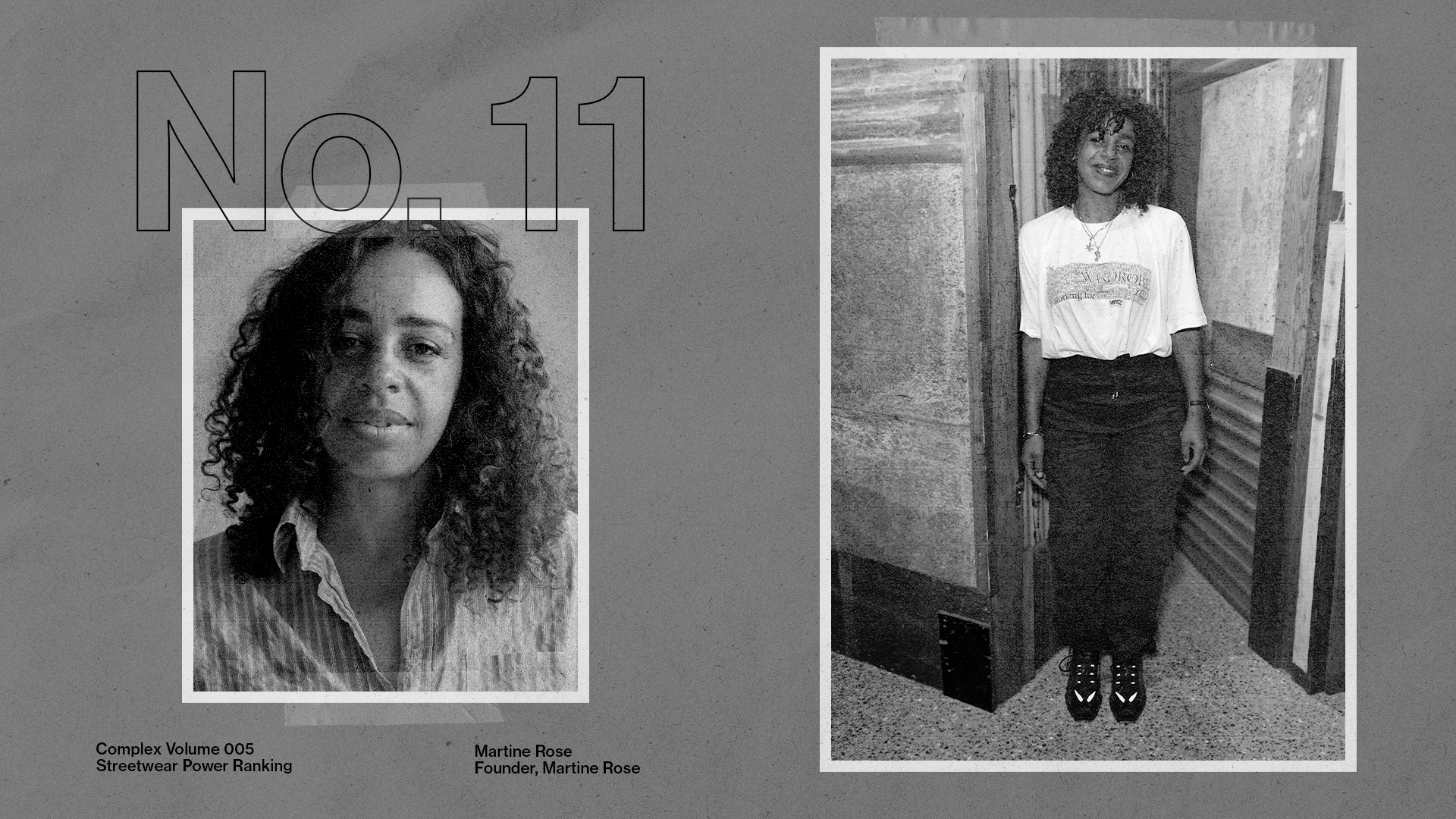
Martine Rose has changed the way men dress. It sounds dramatic but it’s true. While most of the people on this list have created a logo that’s become ubiquitous, Rose, a British designer with Jamaican roots, has shifted the literal shape and look of menswear. Starting her line in 2005, Rose built collections that present more fashion than streetwear, but the underpinning of her work embodies streetwear’s ethos—she’s interested in subcultures ranging from football to the rave scene, and then dissects and reinterprets their uniforms. It’s clear she respects the streetwear category—in 2015 she worked with collective BeenTrill on a capsule collection—and her work influences it. But back to shape. If you had to define the look of Martine Rose, it would probably be a semi-slim high-waist pant paired with a cropped jacket and a clunky, square-toe shoe. And once she started consulting Demna Gvasalia on his menswear line at Balenciaga, that look was amplified and adopted at all levels of fashion, with influential dressers like Rihanna and Kanye West wearing her designs. Nike was smart enough to see the vision and understand Rose’s strengths: turning familiar items into slightly weird but very cool pieces. They gave her the rare opportunity to create a new silhouette with the lumpy Air Monarch 4, which was released in 2019, and most recently the Nike Shox MRF that features a wedge heel—Kendrick Lamar wore them with a full Martine Rose look to the Grammys earlier this year and they’ve collaborated closely on custom tour looks. The United States Women’s National team also wore them along with a Martine Rose tailored fit ahead of the 2023 FIFA Women’s World Cup. Other brands, including Tommy Hilfiger, Stüssy, and Clarks— who named her its first-ever guest creative director—understand the power of aligning with her vision. At one point she was rumored to be a front-runner to design Louis Vuitton Men’s following Virgil Abloh’s sudden death in 2021. And while we were excited at the prospect of Rose having access to LVMH’s resources, when you are a visionary like she is, nothing can stop the impact of her influence.—Aria Hughes
10. Cactus Plant

With exceptions like Camella Ehlke (Triple 5 Soul) and Erin Magee (Supreme), it’s been historically difficult for women to make a name within the male-dominated streetwear industry. However, Cactus Plant has broken through as a woman who runs one of the most beloved streetwear labels since its inception in 2015. And she did it all without ever saying much or showing her face. Her trippy DIY aesthetic has spawned many imitators—clearly influencing the overabundant amount of “good vibes” streetwear popping up across the market. But Cactus Plant’s puff-printed graphics and double-eyed smiley face mascot isn’t just serving a cult fanbase. The brand has continuously executed unique collaborations that garner everyone’s attention. Since 2019, CPFM’s work with Nike has pushed boundaries—CPFM Nikes like the “Overgrown” Dunk Low and its upcoming Air Flea 2s don’t look comparable to anything Nike’s released before. And Cactus Plant's playful eye has garnered larger collaborators outside of fashion such as McDonald’s and L.A. upscale market Erewhon. According to a McDonald's earnings call, 50 percent of Cactus Plant’s “Adult Happy Meal” merch sold through within the first four days of its release last fall, and “drove the highest weekly digital transactions ever in the US business.” Of course, a part of Cactus Plant’s early success is tied to her personal connection to Pharrell, who supported her label from day one after hiring her as his assistant and stylist. (She also worked with him on his debut collection at Louis Vuitton.) And yes, CPFM’s popularity has benefitted from celeb co-signs from the likes of Kid Cudi, Ye, Lil Uzi Vert, and more. Yet CPFM is far from a vacuous vanity brand. It’s fitting that the founder calls herself Cactus Plant. In nature, a cactus is an unassuming piece of wildlife within a desert and she truly moves modestly despite how distinguishable her brand is. Another thing about cacti is that they manage to live for many years, and Cactus Plant is living up to that name. Her next stop? As creative director for ComplexCon 2023 in Long Beach this November. —Lei Takanashi
9. Travis Scott

Few rappers have as much influence beyond music as Travis Scott—and maybe few artists, full stop. The brand he’s built with Cactus Jack has turned into a uniform for his loyal fanbase. Sure, there are other rappers just as popular, like Drake or J. Cole for example, but they can’t get fans nearly as excited about products. Before the Astroworld Festival tragedy, Travis was working with so many companies that Forbes called him “Corporate America’s Brand Whisperer.” He did a meal promotion with McDonald’s and had hypebeasts lining up in drive-thrus, appeared on Reese’s Puffs cereal boxes, held a virtual concert in Fortnite, and even collaborated with Anhesuer-Busch to debut his own hard seltzer brand, Cacti. Could you imagine a J.Cole meal at McDonald’s causing a frenzy? (Us neither.) Part of this is because Travis Scott has made his apparel feel like a legitimate brand, not just merch. That’s due to a greater emphasis on unique graphics, as opposed to simplistic logos slapped on T-shirts, and the inclusion of accessories like studded belts or utility backpacks. Beyond the brand collaborations, Travis Scott’s personal wardrobe also moves the needle. Many people credit him with pushing Nike SB Dunks back into the spotlight around 2018 and 2019. For example, the Stüssy SB Dunk Low used to have a resale value around $500. Ever since Travis Scott wore them, they now sell for upwards of $3,000. And we can’t forget about his ongoing sneaker collaborations. In fact, Travis is arguably the biggest collaborator for the world’s biggest sportswear brand, with releases for Nike and Jordan Brand that still sell out within minutes on drop day. You don’t get the opportunity to release close to two dozen sneakers with a brand like Nike if you don’t have real power. Travis is even moving his collaborations beyond sneakers now. In April, he debuted a collection of racing-inspired women’s apparel with Jordan Brand in Tokyo. And there are no signs of slowing down, with original Nike and Jordan silhouettes designed by Travis Scott rumored to debut in 2024. After the Astroworld Festival tragedy, no one was sure if Travis would retain the same selling power. But he’s been able to mend his reputation, which even further speaks to the influence he holds on the market. Since Utopia dropped, people have been quick to draw musical comparisons between Travis and Kanye West. But maybe the better comparison is outside of music— the brand Travis has built is the biggest we’ve seen from an artist since his mentor, Ye. —Mike DeStefano
8. David Sinatra
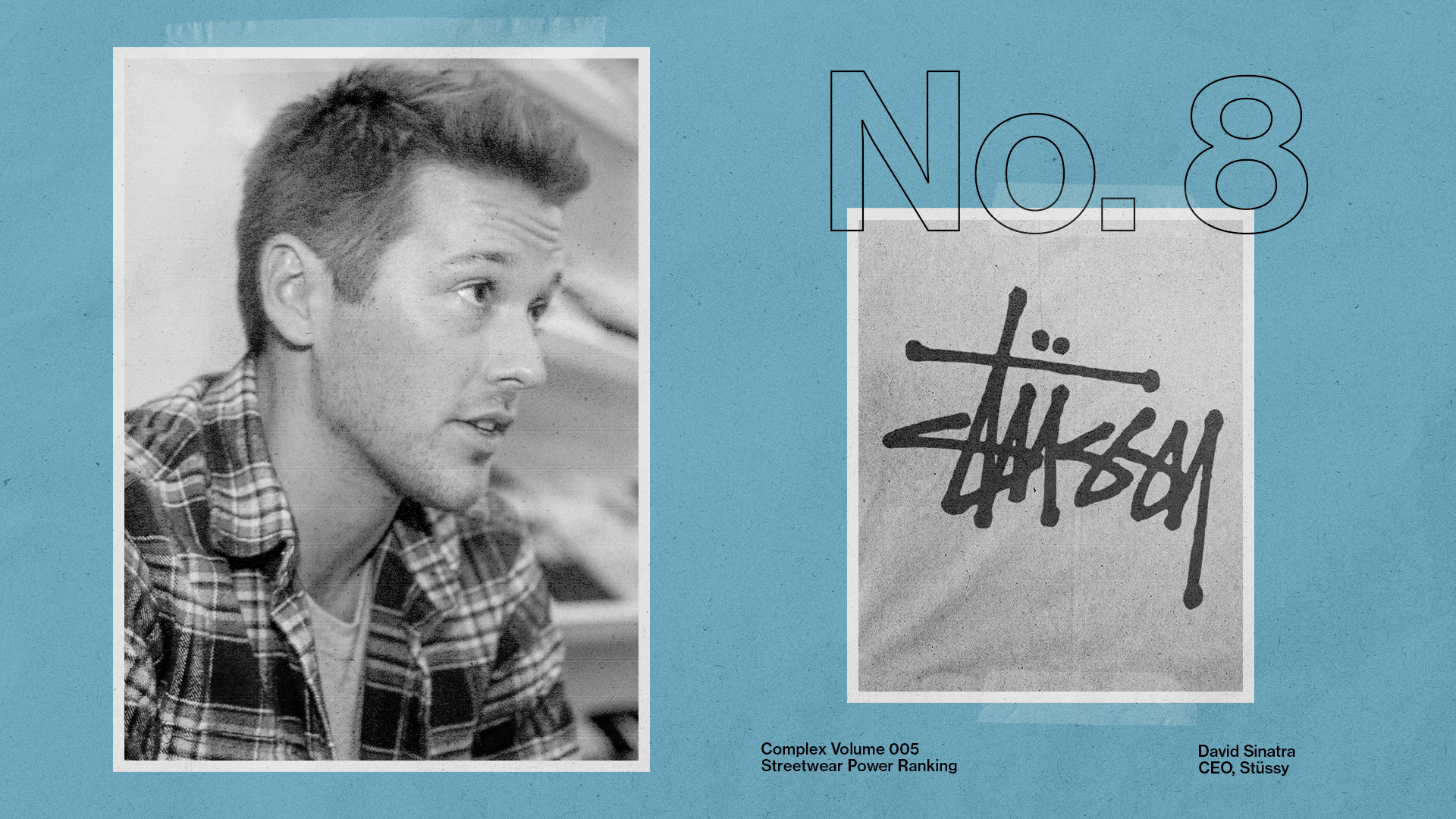
David Sinatra isn’t as well-known as most of the names on this list, but when you are the CEO of one of the biggest brands in streetwear history, you don’t need to be a front-facing entity to make a significant impact. Since 2009, Sinatra has been the CEO of Stüssy. The OG streetwear brand has had its ups and down and at times oversaturated the market, but in 2023, Stüssy is arguably the biggest it has ever been. That's thanks in part to a strategy that eliminated big-box wholesale partners like Macy’s, but maintained wholesale accounts with online shopping destinations like SSENSE and streetwear boutiques like Bodega. At the same time, the brand has continued its global expansion, now operating 29 Chapter stores across four continents. As a family-owned operation, Stüssy was able to recalibrate its business without the pressures of clueless shareholders and lofty sales expectations. But, more simply put, under Sinatra’s leadership, Stüssy was able to go back to its roots and home in on what made it a success in the first place. The result is a brand that’s shown how streetwear can appeal to multiple generations. It attracts Gen Z customers in search of the latest trends without alienating its older consumers who are still coming back to the brand year after year for solid clothing. Stüssy’s roster of frequent collaborators also proves that the brand’s involvement still holds plenty of weight in the marketplace. It releases multiple projects a year with Nike, Comme des Garçons, and the internet’s menswear darling Our Legacy. When Dries Van Noten wanted to enter the streetwear arena, it collaborated with Stüssy in 2022. With Sinatra’s re-positioning of the brand, Stüssy isn’t just a legacy act playing its greatest hits—it is still helping define what streetwear is in 2023. A few years ago, Stüssy could have turned into another past-its-prime brand that reached the point of no return. The team built by Sinatra guarantees that won’t happen anytime soon. —Mike DeStefano
7. Alexandre Arnault
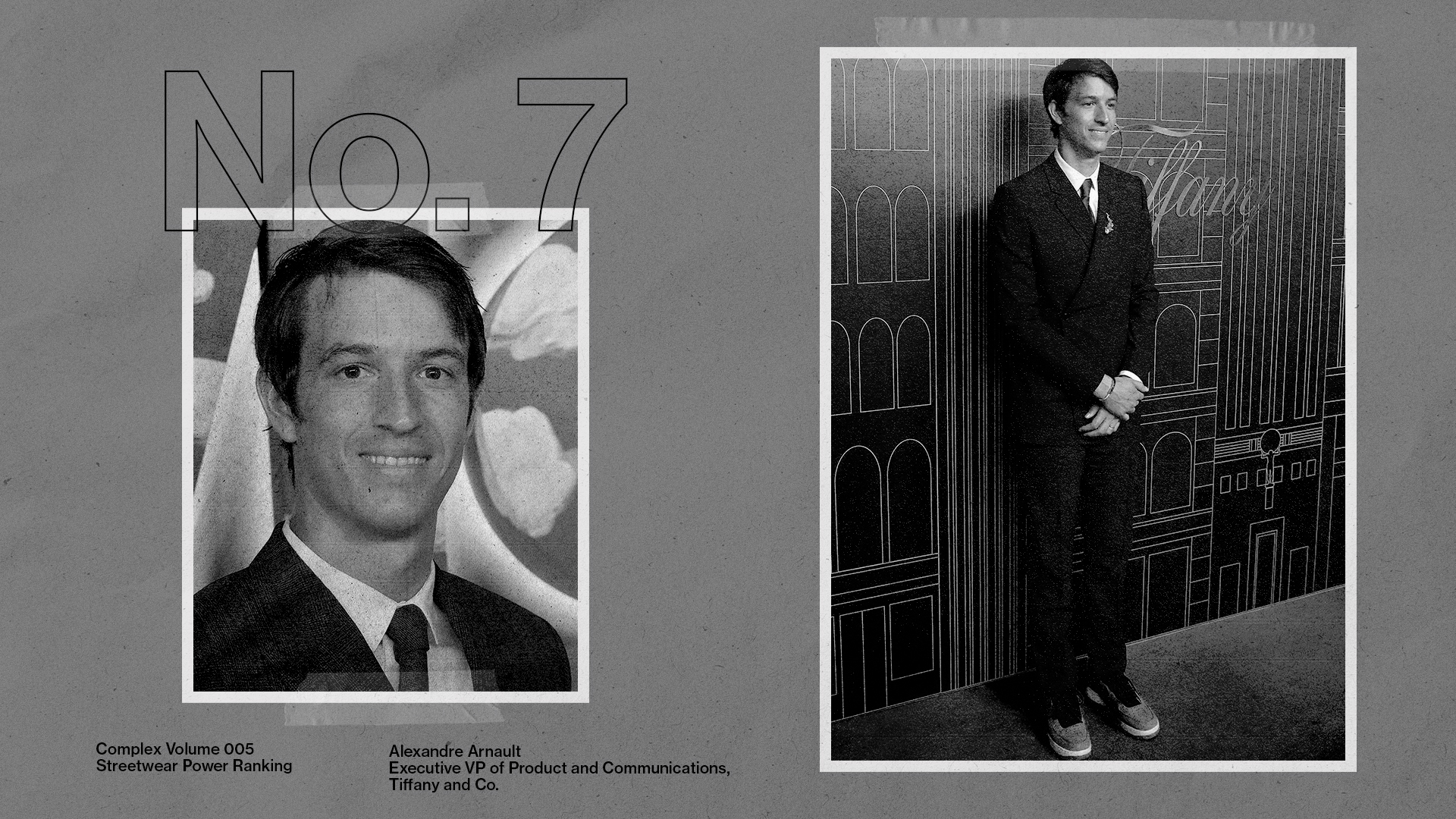
Bernard Arnault, LVMH’s chairman and CEO, helms a luxury conglomerate that owns labels like Louis Vuitton, Dior, and Givenchy, and the empire recently became the first European company to surpass $500 billion in market value. However, his youngest son, Alexandre Arnault, may be the secret weapon keeping LVMH’s brands culturally relevant. Alexandre was the one who called Pharrell to become Louis Vuitton’s new creative director of menswear and told The New York Times that he aspired to work with Pharrell since joining LVMH in his early 20s. While LVMH’s reach extends into many different sectors, it plays an instrumental role when it comes to streetwear’s relationship with luxury. Ye contextualized LVMH’s power best when he spoke on Abloh’s appointment in an interview with Charlamagne. “They got that platform, they got thousands of stores, they got resources,” said Ye, who also told Charlamagne that he once had a deal with LVMH to invest in Yeezy before the board dropped it. It’s not surprising that the youngest member of the Arnault family happens to be the most tapped into what’s currently going on in streetwear. The same year Virgil Abloh became Louis Vuitton’s creative director of menswear in 2018, Alexandre was the chief executive of Rimowa, a heritage luggage label, and spearheaded collaborations with brands like Off-White and Supreme. Since 2021, Alexandre has been the executive vice president of product and communications at Tiffany & Co., which makes complete sense when looking at how the brand has since permeated pop culture. Whether it was those now-iconic Tiffany sunglasses worn by Pharrell or Tiffany’s Nike Air Force 1 collaboration this year, Alexandre clearly makes moves at LVMH that attract a younger audience more interested in streetwear than old-guard luxury. The results of Alexandre’s work are reflected in Tiffany & Co.’s financials. Tiffany has seen its profits double since LVMH acquired the brand in 2021 and has been the largest contributor to LVMH’s growth within the past two years. And Alexandre is the reason why LVMH took a minority stake in ALD last year. The New York Times reported that Alexandre was an ALD shopper for several years and now sits on the New York label's board. While designers like Jones and Marc Jacobs deserve their credit for helping bring streetwear into the luxury conglomerate’s wheelhouse, Alexandre is a big factor whose influence within this community cannot be dismissed.—Lei Takanashi
6. Ronnie Fieg
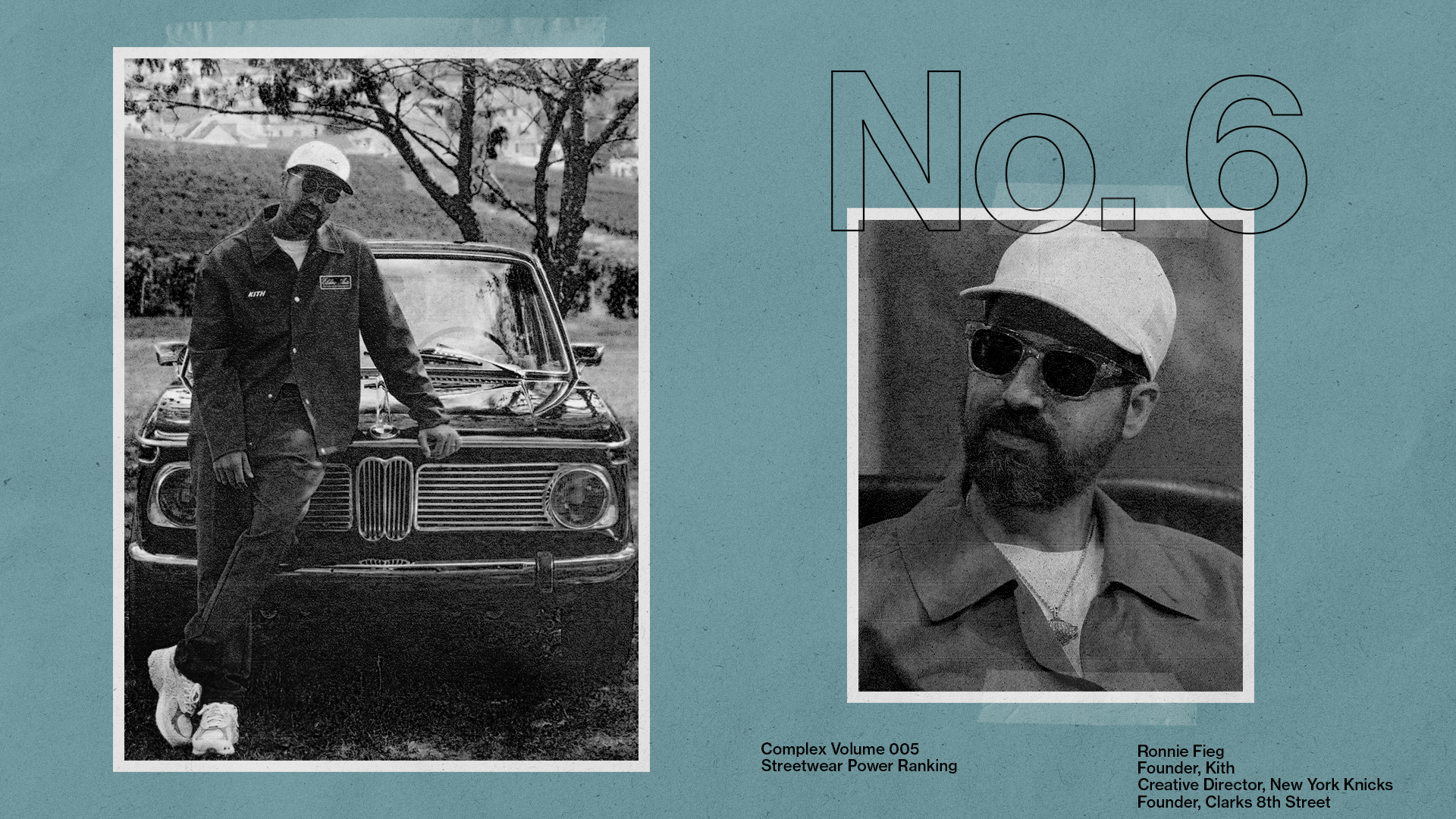
Over the past decade, Ronnie Fieg has built Kith into a streetwear empire. Once relegated to a corner in the back of the NYC store Atrium, Kith is now a global brand with 15 outposts that span across major cities like New York, Los Angeles, London, Paris, and Tokyo. Think of each flagship as a streetwear department store that reflects how streetwear appeals to the masses when its ethos is applied to different mediums. For the culinary world: Kith Treats ice cream and cereal bars and Sadelle’s restaurants. For pop-culture junkies: Kith’s Asics Gel-Lyte IIIs inspired by the X-Men and a lookbook campaign with Jerry Seinfeld. For sports die-hards: Kith collabos with the New York Knicks and New York Giants. With all of these projects, Kith embodies the essence of streetwear by tapping into various elements of culture from Fieg’s street-influenced POV. He’s just doing it on a much bigger scale. Brands have always been drawn to Kith, but they bestowed more power and influence to Fieg lately. He was named the first creative director of the New York Knicks in 2022, and Clarks gave him the opportunity to create his own sub-label, 8th Street. Critics may argue that a large portion of Kith’s products are uninspired collaborations that lean on massive IPs, or that Kith is the epitome of commercialized streetwear. Kith may not be the coolest brand on the market these days, but for this era, Fieg has helped shape the global appeal of streetwear. Building something as massive as Kith makes Fieg’s power and influence undeniable. —Mike DeStefano
5. James Jebbia
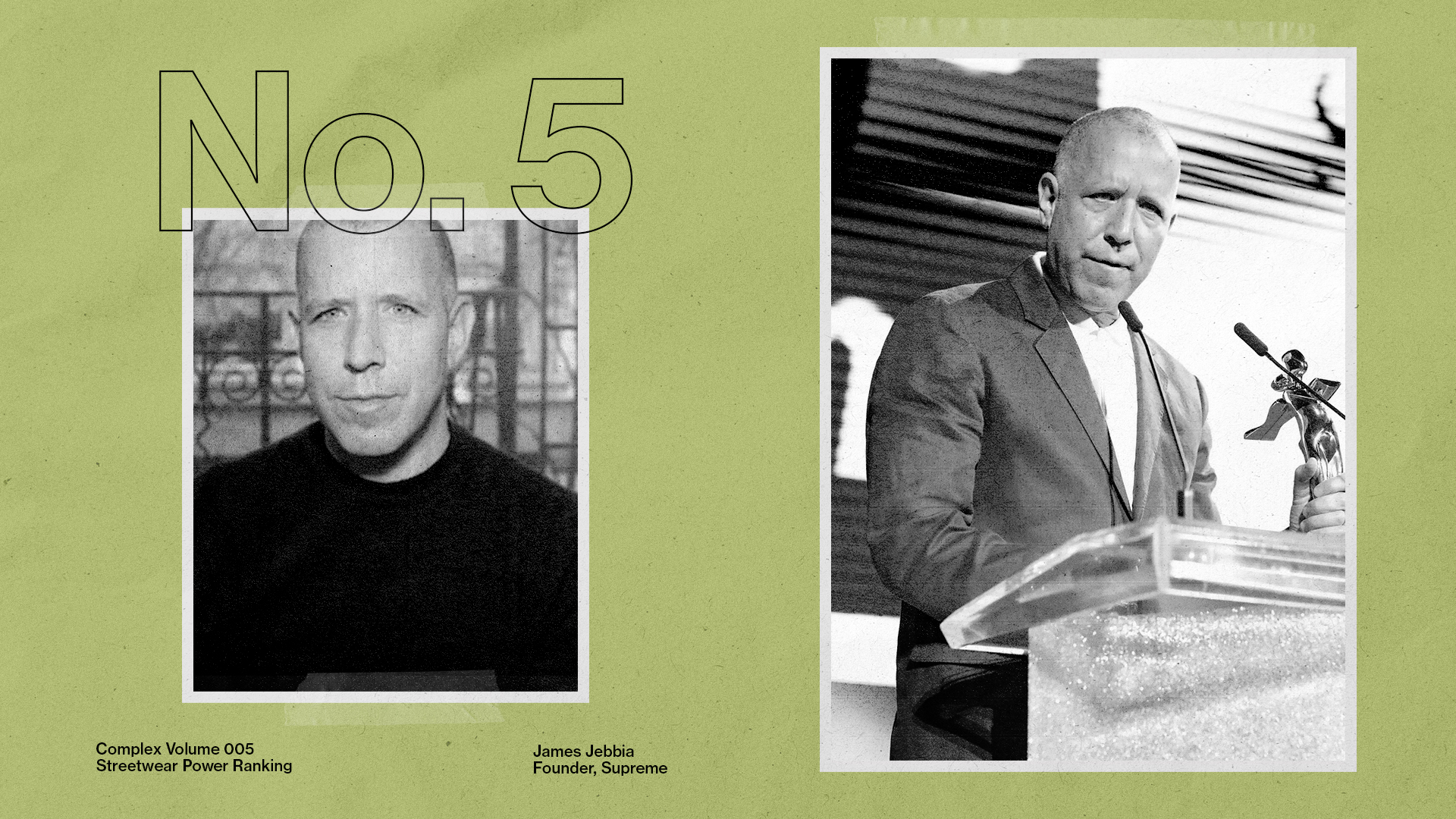
Although most streetwear brands shutter or lose relevance after a decade, Supreme has persevered for nearly 30 years with its original founder James Jebbia sitting at the helm. Its Thursday drops and seasonal lookbooks still draw crowds and conversation, which is partly why the brand sold for $2.1 billion when VF Corp. acquired it in 2020. But it’s been a trying year for the brand. Supreme has come under scrutiny for its lackluster financial performance and teetering brand relevance—and most recently, after the Tremaine Emory resignation, its workplace culture. But whether people are criticizing or celebrating Supreme, there’s no question that they care about the brand and its downtown-NYC roots. But how much longer will they? There are no shortage of challengers to Supreme’s throne, from viral upstart labels like Corteiz to LVMH-backed New York labels like Aimé Leon Dore. Meanwhile, VF Corp. has pushed the brand to grow faster—opening stores in new markets such as Chicago, Italy, and most recently Korea. As reported recently by GQ, Jebbia remains meticulous, checking everything from the rivets and seams on garments and delivering feedback on how far the clothing racks should be separated at its newest store in Seoul. It’s fair to assume that with Jebbia in charge, Supreme will continue to persevere. But as the brand scales, it will have to acknowledge that more people are invested in Supreme than ever before, both literally and figuratively. And whether addressing its falling revenue or its commitments to diversity and inclusion, Jebbia can no longer just sit comfortably in his castle on a hill. —Lei Takanashi
4. Pharrell Williams
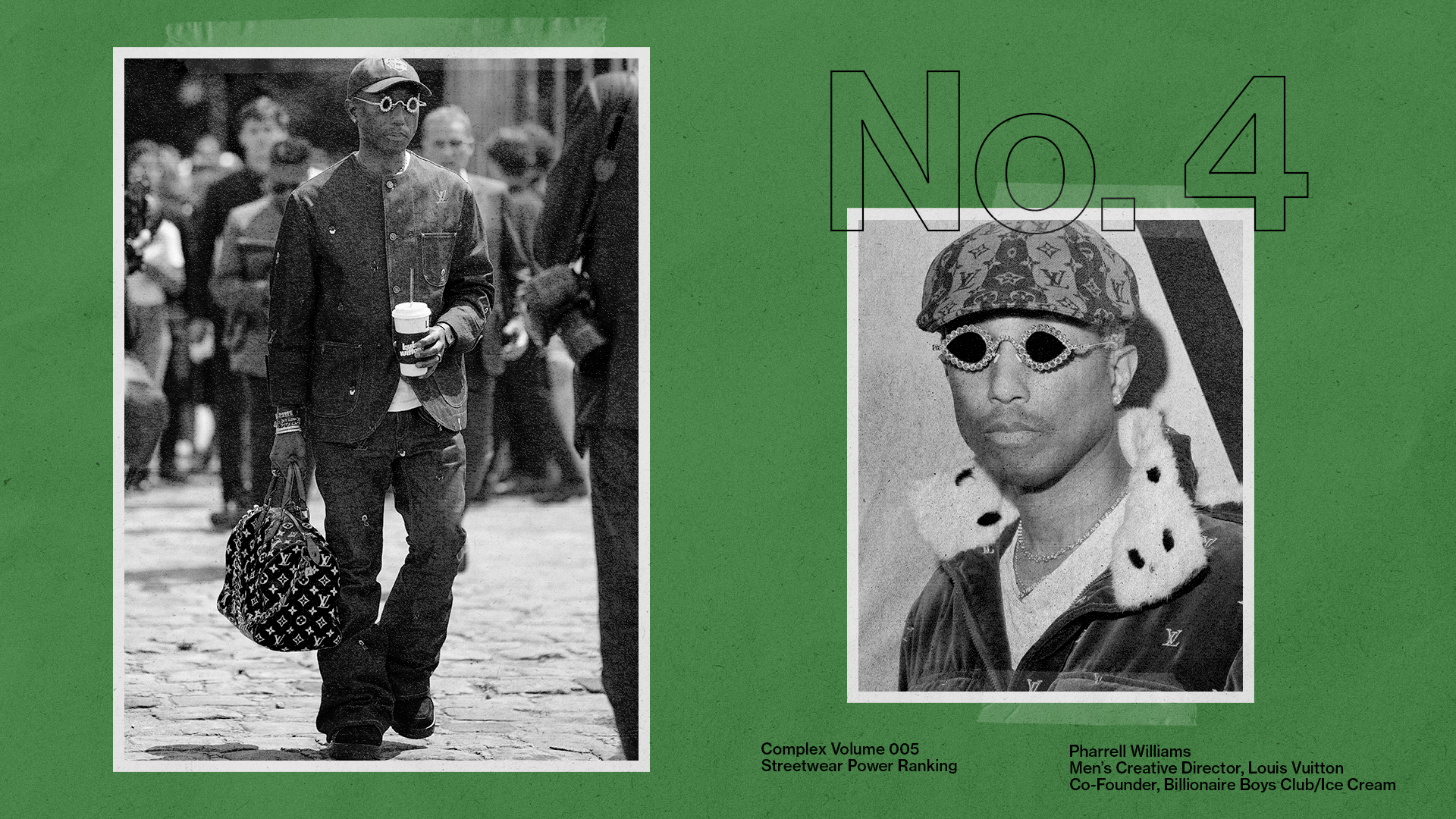
After influencing how we dress and think about clothing for decades, Pharrell being the creative director at Louis Vuitton feels like a culmination of his legacy. Rather than select a classically trained designer for the position, LVMH doubled down on streetwear by asking Pharrell to take over the role that was left vacant following Virgil Abloh’s tragic death. Despite the whispers that luxury fashion had moved on from streetwear, LVMH still understands the importance of it and Pharrell’s reputation within that arena. And by looking at the star-studded spectacle that was Pharrell’s debut runway presentation in Paris with Louis Vuitton, the fashion conglomerate made the right decision. A who’s who of global icons showed up to celebrate the moment, including Beyoncé, Jay-Z, Rihanna (who was featured in Pharrell’s first LV campaign), Zendaya, and LeBron James. The impact didn’t stop there. Lil Uzi Vert wore a pearl track jacket and a green Speedy Bag to the 2023 BET Awards. And photos of Pharrell carrying a $1 million Speedy bag made of yellow crocodile leather the day after the LV show got just as much attention as the looks on the runway did. Clearly, Pharrell’s influence has hardly waned.
But even with his new gig, Pharrell isn’t all about catering to his celeb buddies. Though LV is not a streetwear brand, it’s clear that Pharrell is going to use his position to make sure that the subculture is spotlighted. For example, Pharrell tapped prominent figures within streetwear like Awake NY brand director and former Stüssy consultant Hugo Mendoza to appear in the runway show. And Pharrell is still the owner of Billionaire Boys Club, the 20-year-old iconic streetwear brand that he reclaimed a majority stake in back in 2016. He has also been a long-term collaborator with Adidas since 2014, proving how much weight his name holds when it comes to selling products. With the tools of a major fashion house now at his disposal, Pharrell’s power has risen, and his legacy will only grow stronger. —Mike DeStefano
3. Jerry Lorenzo
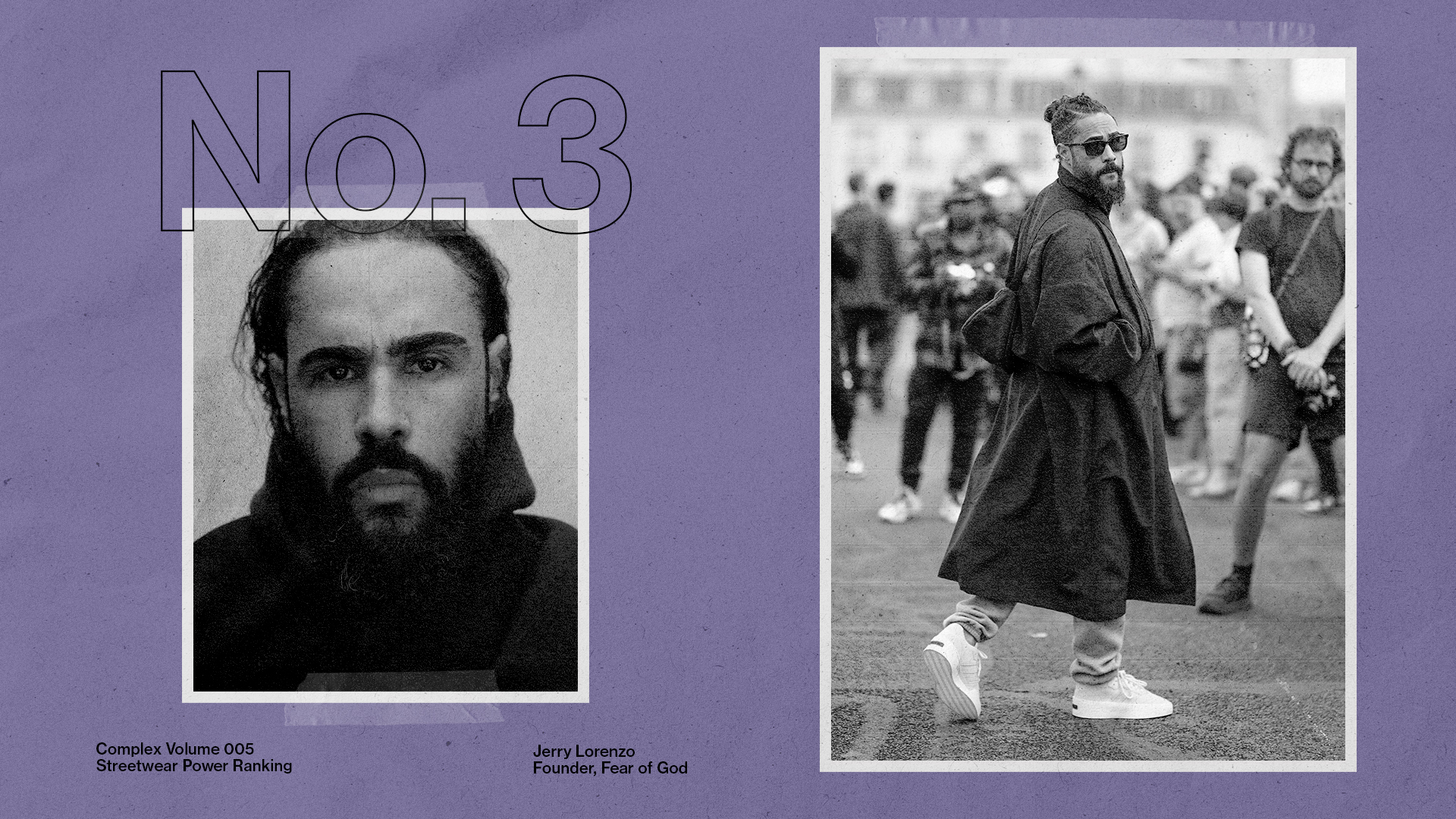
If there is one brand that perfectly defines the fusion of streetwear and luxury fashion, it may be Jerry Lorenzo’s Fear of God. The brand experienced arguably its biggest moment earlier this year when it hosted its first runway show at the Hollywood Bowl, complete with surprise performances from Sampha and Pusha T. Lorenzo could have presented in Paris or Milan among his peers, but packing A-list names from Tyler, the Creator to Tracee Ellis Ross into a 17,000-seat venue in Los Angeles for a standalone event proves Lorenzo’s power and reputation in the industry. But that’s always been Lorenzo’s M.O. While his peers have accepted roles at luxury houses to further their reach, Lorenzo has continued to establish Fear of God as a modern luxury titan of its own. And when Lorenzo does do a collaboration, it’s never a shallow cash crab—his Birkenstock sandal and contemporary suiting with Zegna align with FOG’s established design codes and actually make sense.
While Fear of God’s main line evolves into one of America’s biggest luxury brands, Essentials is just as important to Lorenzo’s business. The earth-toned line of loungewear has become ubiquitous, sold everywhere from SSENSE to PacSun. Walk down the street in any city and chances are you will see somebody in a piece from the diffusion line. Like Ye’s adidas product, Essentials has grown so much because it appeals to crowds beyond the fashionable streetwear set. It’s almost like he’s built a modern-day version of heritage brands like Champion or Russell Athletic. Despite teetering on the edge of oversaturation (it is called “Essentials” after all), there’s no denying the influence of Lorenzo’s sub-label. There’s a reason why so many brands sell sand-colored, oversized hoodies or collections of sweatsuits with minimal logos. Lorenzo made sweats feel aspirational. And don’t forget about the looming Fear of God Athletics line with Adidas. Lorenzo is a model of consistency and exemplifies what can happen when instead of shapeshifting with each fleeting trend, you continue to home in on what you’re good at. —Mike DeStefano
2. Tremaine Emory
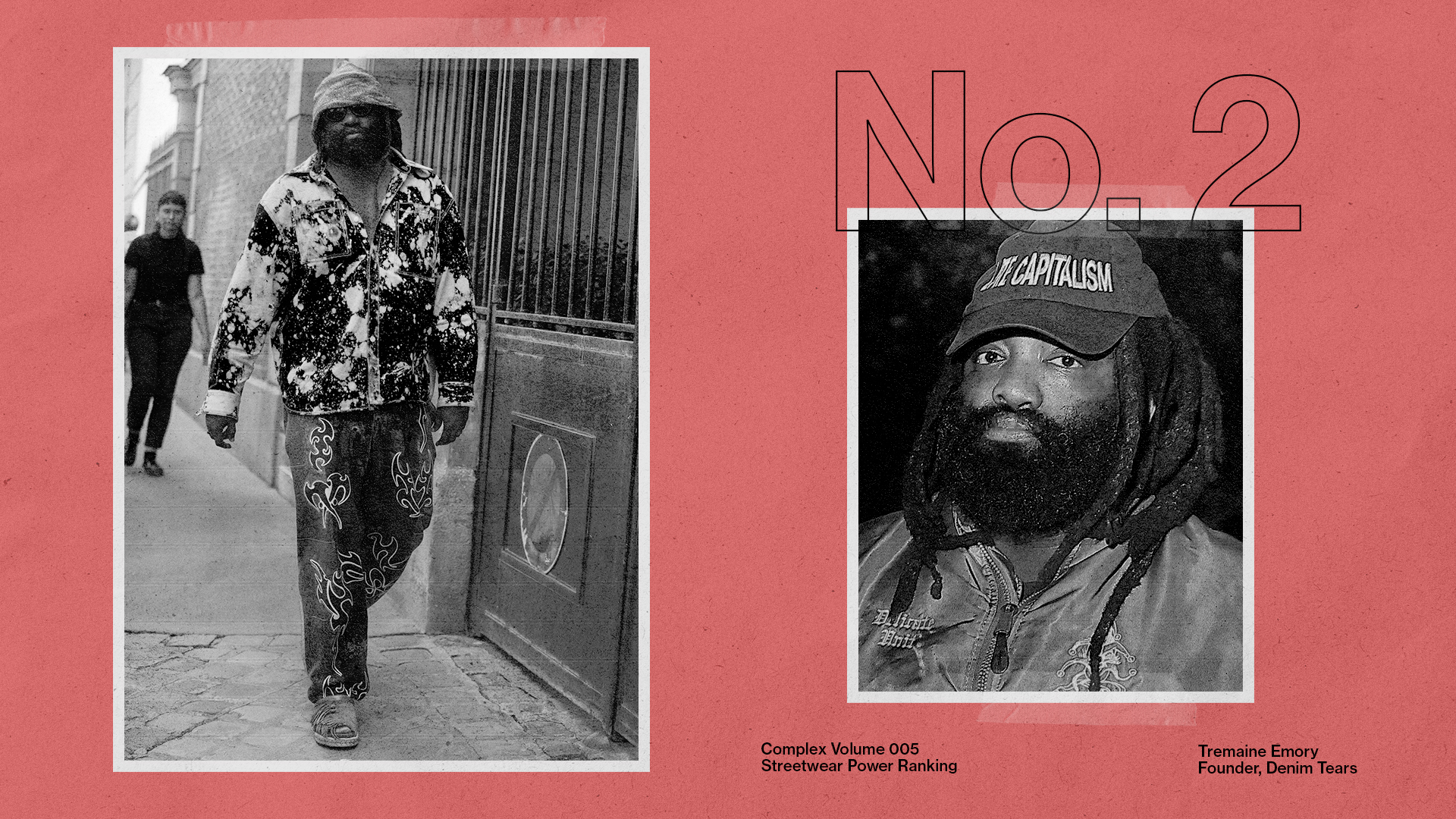
Ever since Tremaine Emory launched Denim Tears four years ago, he’s reminded us all how impactful screen-printed cotton garments could be. Whether it’s for Denim Tears' cotton wreath jeans or what he contributed to Supreme during his short-lived tenure as its first named creative director, the hype for Emory’s product is real. But what makes him worthy of our No. 2 spot is the meaning behind his work. While forefronting Black culture through streetwear has been done before by labels like FUBU or Cross Colours, Denim Tears has approached it in a way that feels more elevated and considered. Emory has employed captivating storytelling to turn Denim Tears into a “Trojan Horse” that uses streetwear to contextualize and celebrate the plight, achievements, and untold stories of Black people that have traditionally been neglected by white-owned streetwear labels. Denim Tears’ “African Diaspora Goods” has garnered partnerships with luxury labels like Dior and mainstream labels like Levi’s because it’s also aspirational. That’s why Denim Tears’ cotton wreaths have the potential to be as recognizable as Supreme’s box logo or a luxury house’s monogram. Whether it’s Polo or LV, Black artists and celebs have traditionally pushed white-owned fashion brands and their logos. But in less than five years, Denim Tears has created a covetable symbol that’s made its mark on fashion and pop culture—Cardi B shouts the brand out in Latto’s “Put it On Da Floor (Remix)” and she dressed her whole family in cotton wreaths. And what’s even more powerful than that cultural relevance is how Emory has leveraged it to push for change. In 2020, he urged Nike to put its money where its mouth is by refusing to release a Converse collaboration unless Nike made actionable commitments to women and people of color. Three years later, he left the biggest job in streetwear and stood up against Supreme, calling out the brand for systemic racism and urging them to push for more diversity and representation internally. No one has ever taken such a public stand against the brand. But for Emory, initiating change that will impact culture for decades to come is important. Whether you agree with Emory’s creative vision or not, he reminds us that streetwear is a powerful artform that should always have something to say.—Lei Takanashi
1. Teddy Santis
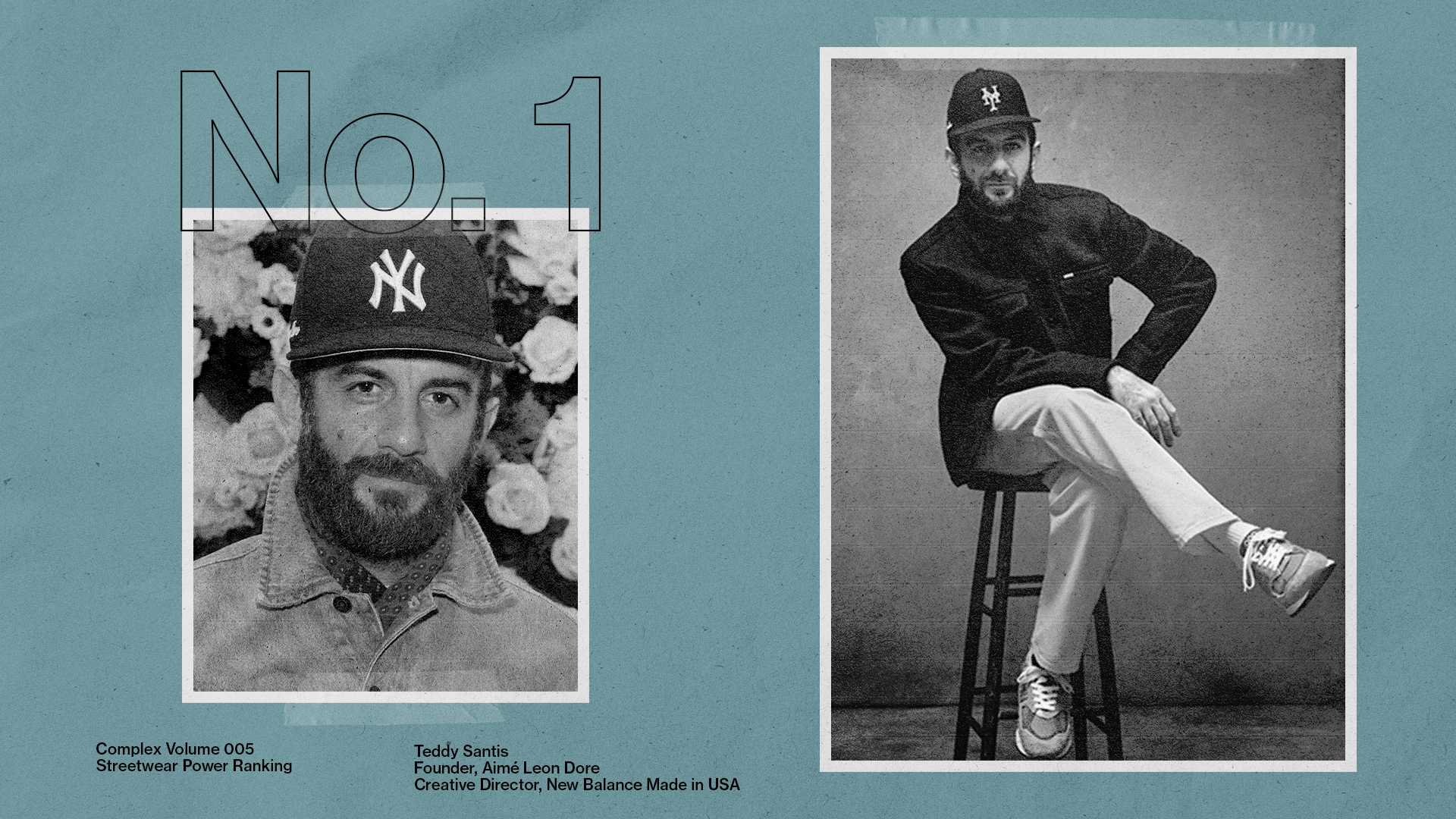
With Aimé Leon Dore, Teddy Santis has achieved something every streetwear brand strives to do. He isn’t just releasing clothes that people want to buy. He has created a community that they want to be a part of. The hub of it all is stationed on a once-unassuming block on Mulberry Street in Manhattan’s Nolita neighborhood that has become a destination for fashionable locals and tourists alike since the brand’s flagship opened up in 2019. Santis has created a commodity—both tangible and intangible—that people wait in line for. An attached cafe gets just as much foot traffic, a great alternative for any shopper who may not have it in their budget to purchase a $90 T-shirt but still wants to feel like they are part of the ALD world. Creating bespoke Porsches and Technohull power boats expand that world into a new tier of opulence. Santis has also proven he can set trends, like when he unearthed the New Balance 550, a forgotten basketball sneaker from the ‘80s, and lit the spark that turned it into one of the most hyped sneakers on the market. ALD’s collaborations with New Balance have been so successful that New Balance even offered him a job. He has been the creative director of its Made in USA line since April 2021.
Through ALD’s visuals, Santis has created a blueprint that has been channeled by various brands, from Abercrombie & Fitch to The North Face. While Santis isn’t the first person to utilize elegant wicker furniture and a Persian rug in a lookbook, the success that he has found with the aesthetic caused a ripple effect in the industry. ALD’s “World’s Borough” visuals feature cameos from across various fields––rappers like Action Bronson, fellow designers like Joe Freshgoods, or the owner of popular L.A .eatery Uncle Paulie’s Paul James––that further exemplify the reach Santis has achieved with the brand. Other campaigns have tapped tastemakers from streetwear’s new class, like Corteiz’s Clint419. And LeBron James even repped the brand in the NBA tunnel last season, a setting that’s typically exclusive to the most influential brands.
ALD’s detractors like to say it’s nothing more than a glorified Banana Republic or a copy of Polo Ralph Lauren’s golden era in the ‘90s. Santis hasn’t been shy about the influence that Ralph Lauren has had on the brand. But where Santis excelled and set himself apart is by taking Polo’s elevated menswear approach and fusing it with elements of New York’s rich culture, like hip-hop and graffiti. While Polo was adopted by Black and brown people, the brand never directly spoke to them; ALD reverse-engineered the equation. Maybe the biggest indicator of Santis’ power in the industry right now is that he was able to pique the interest of LVMH. The fashion conglomerate took a minority stake in ALD in January 2022. Later that year, ALD opened its second flagship in London, a sign of things to come. With the backing of a powerhouse like LVMH, don’t expect the ascension to stop soon. Santis and ALD are going global. —Mike DeStefano
SHARE THIS STORY
